Archived Water Damage Blog Posts
Correcting Water Damage for Southern McHenry County Homeowners
8/15/2022 (Permalink)
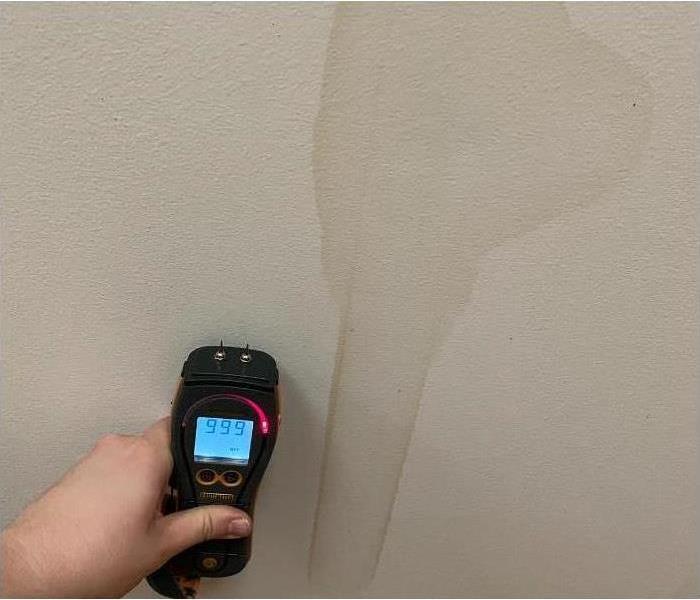 SERVPRO always uses advanced equipment and technology for water damage cleanup and restoration in Newburgh properties.
SERVPRO always uses advanced equipment and technology for water damage cleanup and restoration in Newburgh properties.
SERVPRO Offers Effective Water Cleanup
Property water damage can be disruptive to the everyday lives of homeowners. These emergencies are inconvenient, but they can also be dangerous to occupants and destructive to structures or contents. While most homeowners have insurance to deal with unexpected emergencies, restoration services are responsible for returning their home to a preloss condition as efficiently as possible.
Reducing losses relating to water damage at your home is essential to reducing stress, expense, and time scales. SERVPRO works with a restore-over-replace mentality that focuses on mitigating losses rather than wide-scale replacements. In a wet property, the most urgent task to complete is drying. The length of time a property is exposed to moisture is critical in the amount of damage caused. Part of this process is because of how materials in the building assembly respond to moisture. The other part is because the water itself begins to stagnate. The amount of materials in need of replacement is significantly influenced by the contamination levels of the water they are exposed to. For these reasons, reducing losses through mitigation and drying is a time-sensitive issue that should be enacted as soon as possible.
Professionally drying and restoring a residential property requires advanced drying equipment, experience, and expertise. A solid understanding of how indoor structures contain moisture and the science behind removing that moisture are essential components of a water damage restoration technician's skill set. When mold infests a property, it is usually because of a previous water intrusion that was not professionally restored. To prevent this from occurring at your home, our technicians use a range of measuring and monitoring equipment. These include intrusive and non-intrusive moisture meters, borescopes, and thermal hygrometers. The combination of this equipment allows our technicians to avoid missing potential problem areas such as cavity damage, vapor damage, and moisture migration.
Work Process for Restoring Properties
- Ensuring the safety of both technicians and occupants on-site and documenting the damages.
- Mitigation of water damage through emergency drying systems or pumping of liquid out of the property.
- Cleaning or repairing salvageable items and replacing non-salvageable ones.
Contamination can pose significant challenges to restoration. We measure contamination levels through a tiered system, with class one referring to clean water and class three being highly contaminated. Class one contamination is generally benign and requires little replacement of materials. Technicians can dry the property as well as most materials that were exposed to moisture. In these circumstances, light cleaning methods on carpets or walls can remove all signs of damage. Class three contamination is the highest grade and can involve liquid with biohazardous substances, which require technicians to utilize extensive person protective equipment (PPE) such as hazmat suits. In class three damages, all porous materials that come into contact with the liquid must be removed and replaced.
How Contamination Affects Restoration
- If there are signs of significant contamination, you may need to be relocated during the restoration of your property.
- Technicians can pack out salvageable belongings for safe storage during the restoration of your home.
- Often carpets, drywall, and textiles must be replaced to reduce the likelihood of cross-contamination.
For emergencies at your property, contact SERVPRO of Southern McHenry County for water damage restoration at (847) 516-1600.
What Happens When a Pipe Bursts and Floods My Carpeted Hallway?
8/15/2022 (Permalink)
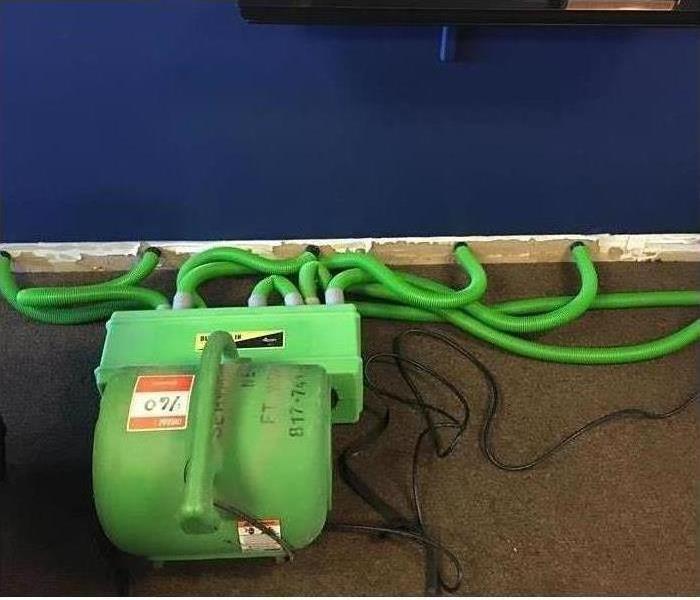 SERVPRO Always Uses Advanced Equipment and Technology for Water Damage Cleanup and Restoration in Middletown Properties
SERVPRO Always Uses Advanced Equipment and Technology for Water Damage Cleanup and Restoration in Middletown Properties
he Water Removal Experts from SERVPRO Can Restore Your Home in Southern McHenry County.
A leaky pipe in the bathroom of your Southern McHenry County home might seem like a minor problem at first as you catch the drip in a bucket. Then one morning, you walk out of your bedroom and find your feet sinking into a very wet carpet. The pipe has burst in the night, and now water has soaked into the carpet. At this point, many residents in the Southern McHenry County area know to call SERVPRO.
What Can the Water Damage Experts from SERVPRO Do to Help?
Our team of trained specialists understands the cleanup and restoration process with water damage to carpeted areas in Southern McHenry County homes. There are several steps for this process which are listed below
- Inspect and develop a plan
- Water Removal using advanced equipment
- Drying and Dehumidification
- Monitoring the process throughout the service
How Do You Determine the Tools and the Protocol?
- We utilize moisture meters, sensors, infrared camera imagery, and even boroscopes for peering into voids to determine the wet or damp areas and then develop an action plan. Some of the devices we use are:
- Light Wands connected to portable wet vacs – Used for initial water removal
- Deep Extraction Tools like Riding Rovers or weighted wands – Used to remove water that has soaked into the padding beneath the carpet
- "Float" the carpet to dry without removing it from the room
What About Water That Has Soaked into the Walls and Baseboards?
If the water has reached into the area behind the walls, then we can use the Structural Cavity Drying Equipment like injecti-dry systems utilizing positive or negative air pressure and heat. We can drill small holes to insert the tubes.
The water removal and damage experts at Southern McHenry County are available 24/7. So, whenever you need an immediate response, call (847) 516-1600.
Southern McHenry County Carpet Cleaning After Water Damage
Is Your Home Prepared for that Other Kind of Water Damage? FLOODING
8/15/2022 (Permalink)
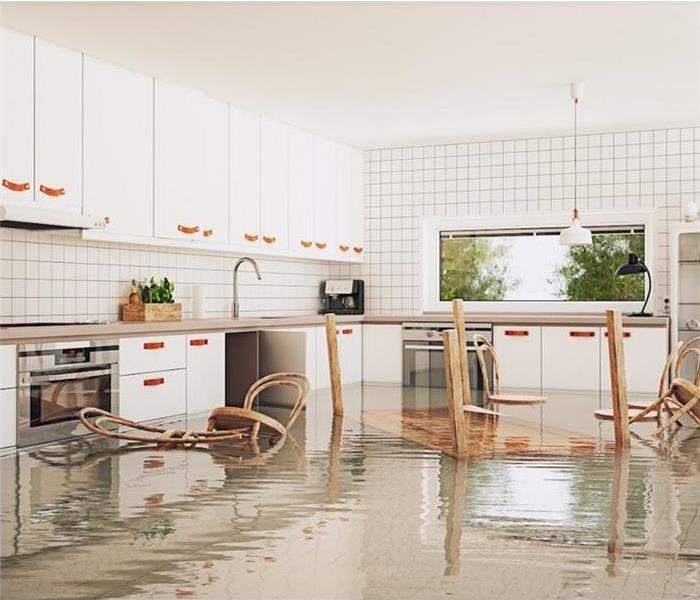 Don’t let flooding in your home prevent you from living in it. Contact SERVPRO 24/7 to assess and remediate the flood damage scenario in your home.
Don’t let flooding in your home prevent you from living in it. Contact SERVPRO 24/7 to assess and remediate the flood damage scenario in your home.
Extreme Water Level Preparation in Southern McHenry County Needs to Include a Reliable Restoration Company
Flooding in Southern McHenry County can happen when you least expect it, from advancing groundwater to a broken water main or ruptured pipe. Despite your best efforts, a rise in water levels in your home can pose a danger to you and your family. Once it is safe to re-enter your home, you should invite a professional cleanup crew to help you assess the damage. Expert advice can save you months of complications and delays in getting life back to normal.
For Southern McHenry County residents, water damage cleanup is a job for our SERVPRO team. Our technical expertise reflects the efficiency with which we survey your home and prioritize cleanup activities. A deficient cleanup job can set the stage for more problems, so we do our best to avoid further complications.
What does a water cleanup company do?
At SERVPRO, we take a multi-pronged approach to the cleanup of your home. Besides removing badly damaged items such as upholstered sofas and carpets, we also inspect your structure. If water is soaking and weakening your drywall or is collecting behind your walls, our team can detect and remove it. Some of the equipment we employ for the extraction includes-
- Drying mats
- Truck-mounted pumps
- Submersible pumps
- Mops and squeegees
- Rags and Buckets
Let Southern McHenry County help you in your time of need. Call us at (847) 516-1600 and let us leave your Middletown or New Windsor home "Like it never even happened."
Water Damage to Hardwood Floors
8/15/2022 (Permalink)
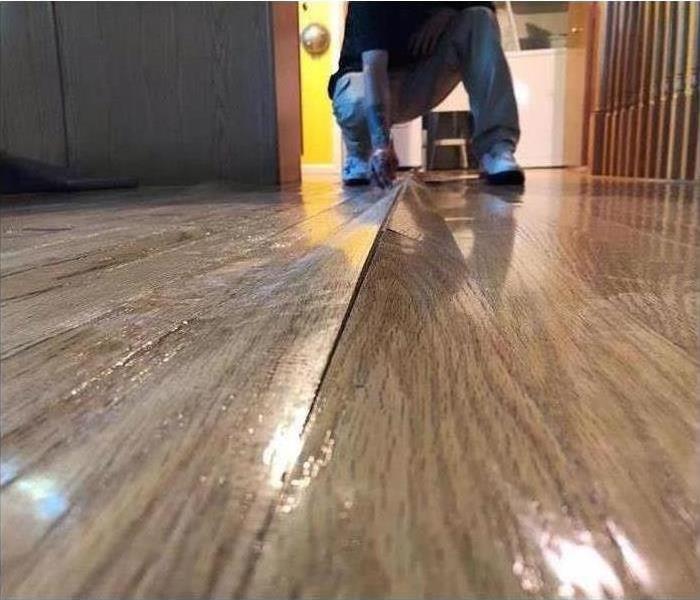 We always encourage water damage victims to extract as much water as possible while they wait for help to arrive.
We always encourage water damage victims to extract as much water as possible while they wait for help to arrive.
How Water Warps Hardwood Flooring
When water floods areas with hardwood floors, the material tries to absorb the water. Excessive moisture forces the wood to expand, which can cause warping or cupping. Here at SERVPRO, we always encourage water damage victims to extract as much water as possible while they wait for help to arrive.
Saving Wet Hardwood Floors
In some cases, we can save your hardwood floors. If the water is quickly extracted and there is not significant warping, then we can use a drying process specifically designed for hardwood floors. But if the flooring was exposed to moisture for a significant period and shows major signs of warping, then your hardwood will need to be removed and replaced.
Call Professionals Before It is Too Late
While it is possible to save your water-damaged hardwood flooring, time is a critical factor. If you notice water damage in your home, call a professional cleanup and restoration company like our team here at SERVPRO of Southern McHenry County. We offer 24/7 emergency restoration services. Call us today at (847)-516-1600.
Handling Your Hidden Water Damage with Precision in Southern McHenry County
8/1/2022 (Permalink)
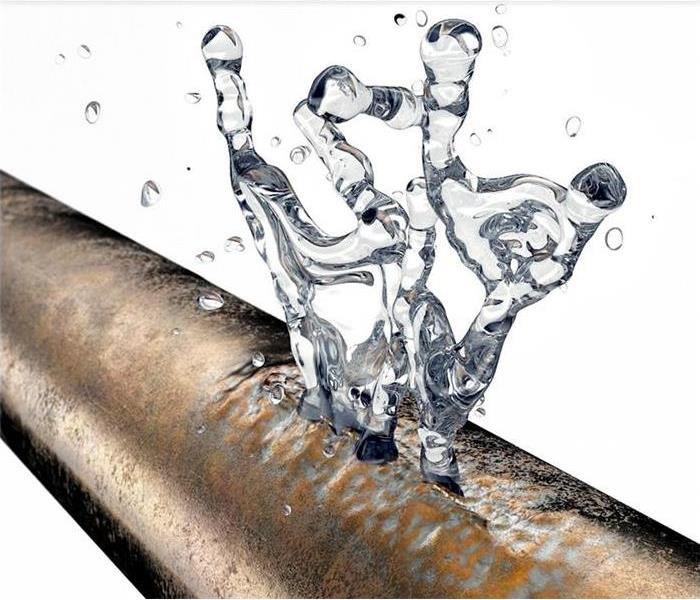 When a burst pipe brings water into your home, team SERVPRO can help. Contact our certified technicians right away to tackle the water damage
When a burst pipe brings water into your home, team SERVPRO can help. Contact our certified technicians right away to tackle the water damage
SERVPRO is There for Southern McHenry County Homeowners for All Water Damage Calls
You may have experienced a minor water spill in your Southern McHenry County home and just grabbed the mop and bucket to clean it up. If the water did not make its way to your baseboards or under carpeting, you might be in the clear. However, moisture migrates to dry spaces while following the path of least resistance. Any spills where water travels warrant a call to SERVPRO so that we can take the appropriate measures to keep secondary damage and black mold from developing. With our training and experience, we make water-related incidents in your home “Like it never even happened.”
What About Stains on the Ceiling?
In addition to burst pipes and flooding, we also receive calls for water damage in Newburgh that involve leak detection and signs of hidden moisture. SERVPRO’s IICRC-certified water restoration technicians (WRT) know how to spot potential issues where water or moisture seeped into your ceiling or drywall and left brown stains.
There may be several possible causes of water stains, including:
- A leaking roof from storms – If you have faulty flashing, missing shingles, or other roof damage, it can cause leaking with each rainstorm.
- Slow-leaking pipes – Water stains may develop as a tell-tale sign whenever plumbing leaks from an overhead bathroom.
- Attic or HVAC condensation – Homes with attics or properties with a possible HVAC issue may end up having signs of water damage. There could be a lack of ventilation or another issue that needs to get addressed before the damage worsens.
With our moisture detection tools and dehumidification equipment, our team gets to the heart of the problem in no time at all. We initiate controlled demolition to replace building materials to restore your property to pre-water damage condition for any areas showing signs of damage.
SERVPRO of Southern McHenry County are there no matter the type of water damage or restoration emergency you have. Call for 24-hour service at (847) 516-1600.
Fall Weather Can Be Destructive
11/9/2021 (Permalink)
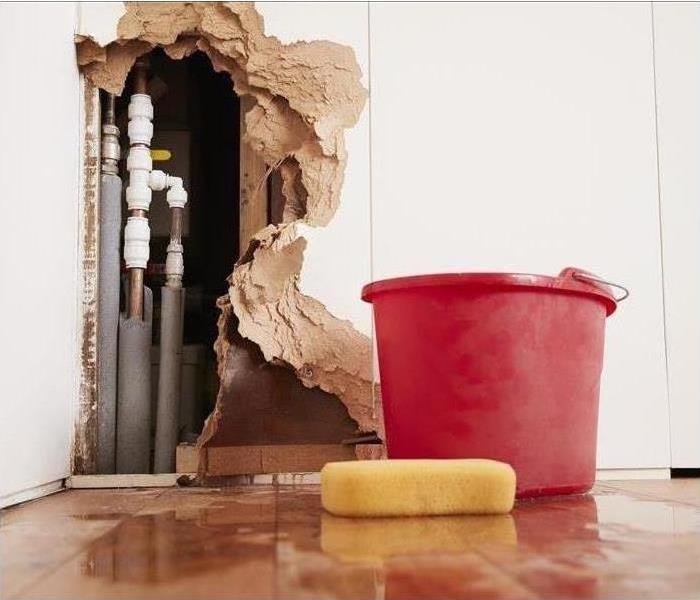 In these wetter months, we all must consider the possible damages that can happen to our structures during this time of year
In these wetter months, we all must consider the possible damages that can happen to our structures during this time of year
Since we are now in the fall season you may have noticed a lot of rain. In these wetter months, we all must consider the possible damages that can happen to our structures during this time of year. Fall weather may not be as destructive as winter, but it is better to prepare for water damage before it is too late.
For homeowners, some concerns due to fall weather can be:
- Eroded landscaping
- Rutted driveways, especially those that are graded either up or downhill
- Moldy siding, windowsills, doorjambs, windowpanes, and roofing
- Rotting wooden fencing and decking
- Leaking roof
- Puddles and pooling
For business owners, some concerns can be:
- Potholes and eroded surfaces in public parking areas
- Eroded walkways or damaged, buckling sidewalks and public walkways
- Leaking roofs
- Damaged materials and machinery that have not been stored properly
Businesses must also keep an eye on employee bathrooms and kitchen/break areas to make sure that leaks are handled immediately and that spills are cleaned up right away. During bad weather, customers and vendors will track water and debris into your building, and both for safety and aesthetics, it will be a good idea to keep up with this type of accumulation to prevent water damage. Have an umbrella stand ready for everyone who comes through the door!
Homeowners also need to keep up with spills, leaks, and traffic, but it will obviously not be such a large job. In a home, water damage is more likely to come from a water heater or dishwasher that is malfunctioning, or a washer that has developed an issue.
One thing both types of structures must be concerned about is mold, however - it is never a good thing to realize that mold has taken hold in either your home or your business. Mold just needs two things to grow: water and humidity. It can infest a home or business in as little as 48 hours and even the tiniest of unchecked leaks can produce an infestation. With a household or workplace mold infestation can come health effects, making it an uncomfortable living, or working environment.
If you suspect mold, weather because of water damage, or just from damp conditions, you should call SERVPRO of Southern McHenry County as quickly as possible. We are always “here to help," and have the training, equipment, and expertise to take care of your mold problem. Our goal is to get you back to a clean, healthy home and make it "Like it never even happened.”
Why Did My Basement Flood?
8/3/2021 (Permalink)
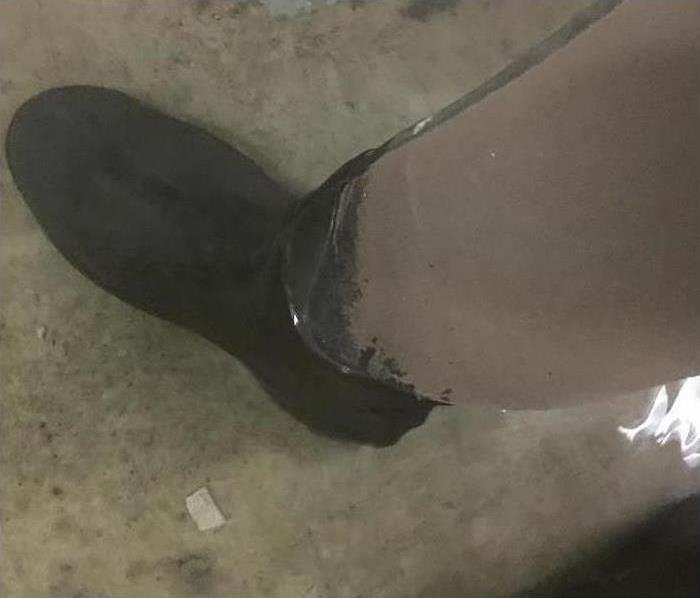 Water will find the least path of resistance and it could be into your basement. Be prepared and know how to prevent a flooded home!
Water will find the least path of resistance and it could be into your basement. Be prepared and know how to prevent a flooded home!
Why Did My Basement Flood?
Flooding of basements is one of the most common issues most homeowners face. Although flooding occurs during heavy rains or rapid snowmelts, it can also occur in dry weather.
There are many reasons for basement flooding including seepage, storm sewer backup, and improper grading among others. As the basement lies in the lowest level of a building, it is prone to flooding.
What causes basement flooding?
These are the most common causes of basement flooding:
Foundation Leaks: Water can seep into the foundation if there are cracks in it. The risk of flood in your foundation is more if your home is near groundwater. Cracks in the foundation can lead to significant water leakage into the basement.
Leaking basement windows: Windows in the basement can leak and let water creep in during rains. Whenever it rains, there could be a significant collection of water on the windowsills. Fixing the windowsill is the only option to prevent basement flooding.
Blocked sewer: If the manifold that connects the public sewer system to your house is blocked it can lead to floods in your basement. It is important to call local authorities immediately to address blocked gutters and SERVPRO of Southern McHenry County to mitigate the sewage and water damage.
Debris in gutters: The gutters play a critical role in preventing basement flooding as they carry away rain water from the home. If they are clogged or damaged, they can overflow during rains and allow water to build up. If the ground near the basement soaks up too much water, it can seep into the basement as well.
Improper grading or sloping: If the yard does not slope away in the right manner, rain water does not drain effectively. If the sloping is towards your home rather than away, excess water can result in basement flooding.
Improper downspouts: Downspouts channel water away from the foundation and should be at least 5 to 6 feet away from the wall of the basement. If the downspouts are missing or broken, water tends to pool near the house and slowly seeps into the basement.
SERVPRO of Southern McHenry County provides professional emergency clean up and restoration services on a 24/7 basis. Should you encounter water or sewage damage call our office directly at 847-516-1600.
Preventing water from entering through window wells
8/3/2021 (Permalink)
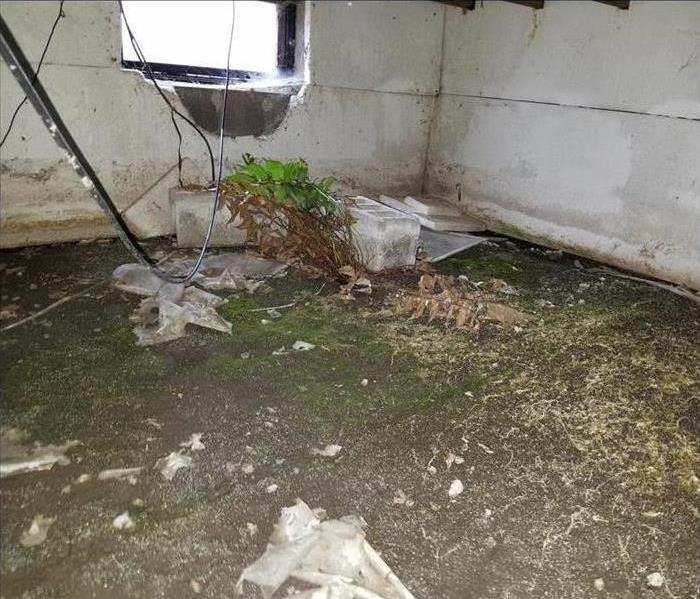 Fixing (or preventing) a window well filling with water is all about two components of the window well system – the drain and the cover.
Fixing (or preventing) a window well filling with water is all about two components of the window well system – the drain and the cover.
Window Well Drain – Every window well should have a drain to allow water to exit the window well and not build to a level that creates a basement seepage problem. Drains can be connected to interior or exterior drain tile or can be run to daylight where a proper slope exists. With a well-constructed and properly maintained drain, a window well should never fill with water.
Of course, some home builders will take short cuts with window wells and install them without drains. More commonly, though, the drains are there but, because of lack of maintenance, they clog up.
So, one way to fix a window well that is filling with water is to find and unclog the drain. Cleaning debris from the opening to the drain is usually a fairly easy task but, if the drain has become clogged below the surface it can be difficult to unclog. The best way, of course to deal with a clogged window well drain is to prevent it from clogging in the first place by installing a proper window well cover.
Window Well Covers – The most important function of a window well cover is not keeping out water but keeping out the kind of debris – leaves, grass clippings, trash – that will clog the drain. Many homeowners make the understandable mistake of installing flimsy plastic “bubble” covers from the hardware store thinking that they will keep out water. While still intact these covers create a surprisingly efficient greenhouse for weeds but are easily cracked and broken, rendering them useless.
A steel grid cover is better but can still admit a lot of debris.
The best window well cover will be constructed of reinforced polycarbonate and will be custom-fitted to the window well to ensure that it covers it completely. This type of cover, while incidentally preventing most water from entering, will do an excellent job of keeping out debris (and small animals) and keeping the window well drain open and working.
-Source: U.S. Waterproofing
Making the right choice for Water Mitigation
8/2/2021 (Permalink)
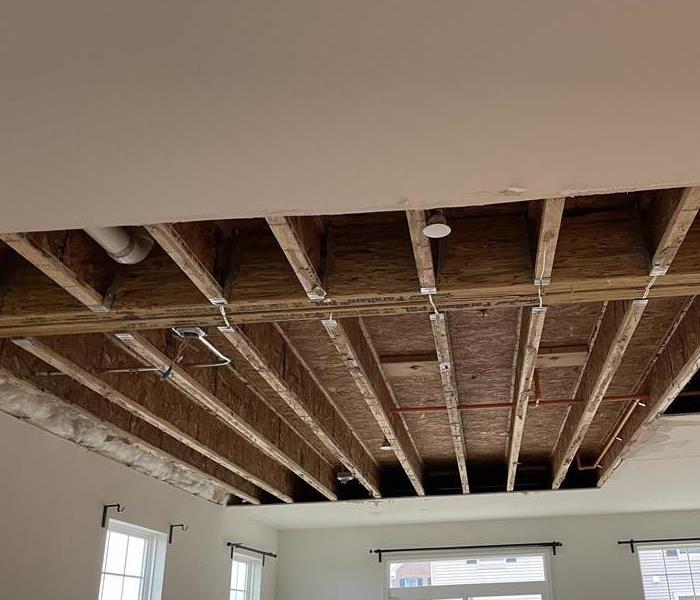 This home had a significant water issue, and as you can see, the line on the ceiling was cut evenly and is ready for an easy rebuild.
This home had a significant water issue, and as you can see, the line on the ceiling was cut evenly and is ready for an easy rebuild.
We agree water damage is not a great time in many of our customers' lives. At the moment you walk into your home and see water damage, you have many thoughts going through your head.
- Who is going to clean this up?
- How am I going to pay for this?
- Why is this happening to me?
- How did this happen?
- Where is the water coming from?
At this point, all of those questions need answers. We want to be that company that is top of mind to help you through the entire scenario. We can be that one person who can help answer all the questions above.
You are also worried about the work being done correctly. SERVPRO of Southern McHenry County has highly trained staff to ensure each step of the process is done by the book. Each piece of equipment is placed where it needs to be so that the materials in your home dry properly. Each material that needs to come out is cut precisely or taken out with care. We come into your home and treat it like we are the guests there. We make sure contents are out of the area and ensure that no contents are damaged during the process.
Sewer Backup in Southern McHenry County, IL
8/2/2021 (Permalink)
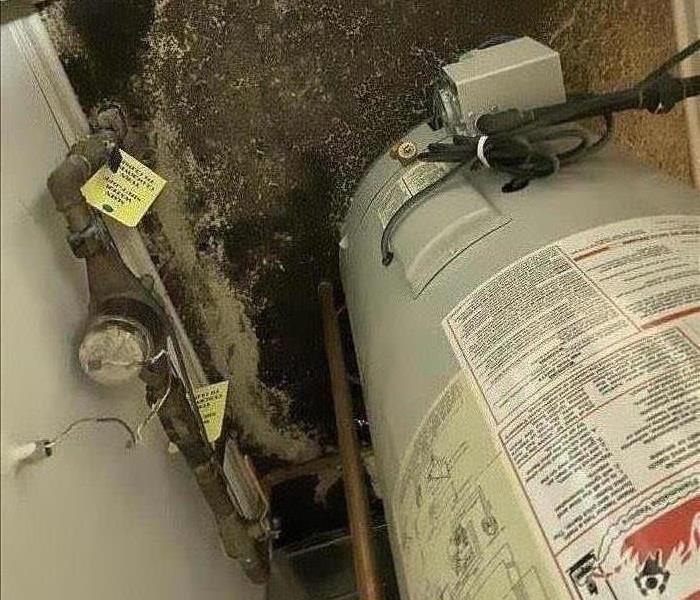 This is the utility room where the sewer city line clogged and backed up into the utility room & bathroom.
This is the utility room where the sewer city line clogged and backed up into the utility room & bathroom.
Sewer Backups - We can help!
When people think water damage, they automatically think about flooding but there are several other types of damages that can occur. One of the worst types of water damages are sewer backups. You will see in the picture actual sewer that shows that it came up through the main drain pipe. This type of sewer backup was caused by a clog in the main city line. Unfortunately these homeowners were not aware this is something that could have happened in their home.
This homeowner called SERVPRO after seeing the commercials on TV hoping we could help. We were able to go to the home, start the cleanup, help with the odor and give the homeowners their bathroom back.
If it is clean water or sewer water, SERVPRO of Southern McHenry County can help you with any type of water damage.
An Overview of our Drying Equipment
7/23/2021 (Permalink)
 Moisture Meter
Moisture Meter
Moisture Meters (like the one above) are used to determine the actual moisture content of various materials.
Even small water damages have the potential to cause serious structural and indoor air quality issues over time.
The key to avoiding costly future restoration is to handle every water problem as a real threat to your property. SERVPRO of Southern McHenry County has the equipment, training and experience to find and dry unseen water before secondary damages occur. The proper equipment makes a measurable difference in reducing the damage expense during a fire or water loss.
When time matters, technology and equipment must be counted on to perform properly. Our team will answer your call with fast action and a full arsenal of drying equipment. Here are a few of the tools used by our highly-trained technicians.
Moisture Sensors are used to detect moisture in carpets, baseboards and walls.
Moisture Meters are used to determine the actual moisture content of various materials. The moisture tester provides accurate readings, allowing SERVPRO of North Everett/Lake Stevens/Monroe to monitor the drying process.
Thermohygrometers measure temperature and relative humidity. When armed with this information, we can calculate and create an environment most conducive to drying. When facing a contaminated water loss, it is not only important to dry the structure, but the structure must also be disinfected and often deodorized.
Ultra Low-Volume (ULV) Foggers will atomize liquid deodorizing agents, producing a fine mist that can easily penetrate the site where odor-causing residues may accumulate. This device can also be used to inject fungicides and disinfectants into wall cavities and other hard-to-reach areas.
Thermal Foggers dispense solvent- based products by creating a dense fog. The fog consists of tiny particles of deodorant solution that attach to and neutralize odor- causing particles to deodorize structures, garments, automobiles and other places where cleaning cannot reach.
The bottom line? SERVPRO of Southern McHenry County has the training and equipment to make it “Like it never even happened.” Call us today at 847-516-1600.
What Happens When a Bathtub Overflows in Southern McHenry County Homes?
7/21/2021 (Permalink)
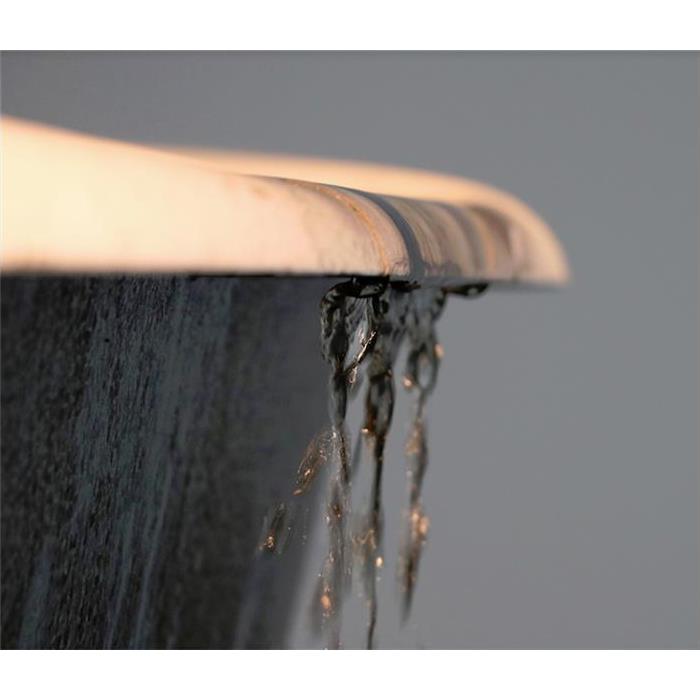 Accidents happen rather quickly. Be prepared by calling SERVPRO for water removal and effective remediation services.
Accidents happen rather quickly. Be prepared by calling SERVPRO for water removal and effective remediation services.
SERVPRO Provides Water Damage Mitigation When In-Home Flooding Occurs in Southern McHenry County
An overflowing bathtub can cause significant damage to your home. The water goes under the flooring, behind cabinets, and can migrate to lower levels if the bathroom is on a higher level. SERVPRO provides water damage remediation that can prevent further problems when contacted right away.
Professional Water Removal Services
Whether it is an overflowing bathtub, burst pipes, or ceiling leaks, you need to quickly get the situation under control. SERVPRO arrives ASAP and provides water damage mitigation in Southern McHenry County homes, hit with in-home flooding. Services we offer include:
- Basement flooding cleanup
- Water damage repairs
- Ceiling repairs from water damages
- Water cleanup
- Emergency services for water damage
Water Damage Restoration You Can Trust
When we arrive, we use specialized equipment to trace the water’s migration path, ensuring all moisture gets located and removed. Often we can save flooring and carpeting if called in immediately. We use the correct ratio of dehumidifiers to air movers for optimum drying. We determine the correct drying times to avoid problems that can occur when certain materials are dried too fast.
Call in the Professional Water Restoration Team
When you need quality water damage mitigation, contact SERVPRO of Southern McHenry County. You can reach us at (847)-516-1600.
How to Prepare Your Home for Winter
12/21/2020 (Permalink)
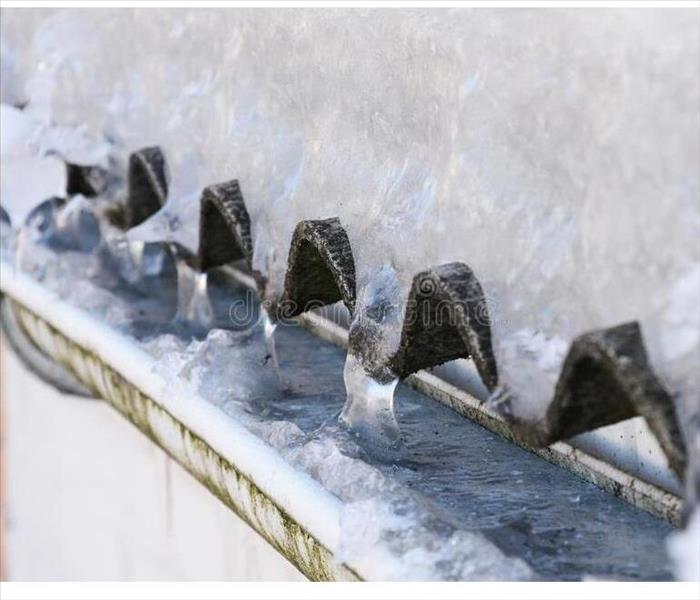 It’s time to prepare your home for colder winter months. Preparing for the change in season can help save energy and prevent costly damage.
It’s time to prepare your home for colder winter months. Preparing for the change in season can help save energy and prevent costly damage.
As winter fast approaches, it’s time to start preparing your home for the colder months of the year. Problems you may not have noticed during the rest of the year can become a bigger issue as the weather starts to shift. Properly preparing for the change in season can help you save energy and prevent costly damage.
Prepare Your Pipes
The last thing you want during the winter months is a frozen pipe. Water expands when it freezes, which can result in burst pipes, flooding, and major water damage.
Leaky pipes can lead to expensive problems if they’re left untreated when winter comes. Watch for telltale signs of leaky pipes such as unexplained high water use or water damage. If you suspect you might have a leak, get your home inspected.
If you have any pipes in unheated or uninsulated areas of your home, make sure to wrap the pipes with heat tape or pipe insulation.
If you plan to head south for the winter or go out of town for an extended period of time, you may want to consider shutting off the water completely and hiring a service to drain your pipes.
Shut Off Exterior Faucets
Don’t forget your exterior water systems. If you don’t properly drain water from your exterior faucets/pipes, they may freeze, expand, and cause damage. Disconnect garden hoses, and drain the water out of the faucets. Unless you have frost-proof faucets, you’ll need to use the shut-off valve located inside your house.
Inspect Your Heating Systems
Before the first frost, have your HVAC system inspected. This will allow you to identify potential problems early and enjoy energy savings throughout the winter months. Make sure to vacuum out the vents, replace furnace filters if needed, and check for issues like leaks, cracks, or an underperforming system.
Inspect and clean your fireplace and chimney as well. You’ll want both in top shape for those cozy nights next to the fire.
Reverse Your Fan
During the summer months, most fans turn counter clockwise, which allows the slightly angled blades to push air down. This creates a wind-chill effect, which cools down the occupants of the room.
Warm air rises, which unfortunately means the warmest part of a room is well above you. If you can force the cooler air upward, you can push the warmer air down to your level and not have to turn the heat on quite as high. If you reverse the fan to rotate clockwise, it will pull up the cooler air from the bottom of the room toward the ceiling, which will force the warmer air in the upper part of the room down.
Clear Your Gutters
It’s always a good idea to clean out the gutters, but it’s especially important right before winter. The fall months, while beautiful, come with a lot of natural debris. Unfortunately, fallen leaves, twigs, and pine needles can clog up gutters and cause ice dams and icicles in the winter. Regularly clear out the debris to prepare for winter.
Examine Your Roof
Even small leaks in your roof can cost you in both utilities and greater damage to your roof. Clear the debris off your roof, and take a look at its current condition. Watch for damaged or missing shingles, any pooled water, or other signs of potential roof damage.
Seal Your Doors and Windows
Check your weather stripping and re-caulk around doorways or windows as necessary. If gaps between siding and a window or doorframe are bigger than the width of a nickel, it’s time to re-caulk. Make sure you use caulk that’s recommended for home exterior use.
Whether you find problems while preparing your home or it sustains winter-related water damage, SERVPRO® of Southern McHenry County is here to help.
We offer 24/7 emergency service, and we can help prepare your home or restore water damage “Like it never even happened.” Call us at 847-516-1600.
Sprinkler Systems in your Multi-Family Structure
11/1/2020 (Permalink)
The sprinkler system in your multi-family structure is made to go off when it senses extreme heat (174 degrees Fahrenheit or above). The heads contain a temperature-sensitive mechanism that can only be activated when the temperature at the sprinkler head exceeds the allowable range, and they operate independently, with those directly exposed being set off. Most fires are extinguished, or controlled, by three sprinklers or less, but the damage from just one sprinkler head can be significant: a sprinkler head can release from 15 to 40 gallons of water per minute and can fill an entire bathtub in under two minutes!
Prompt and professional decision-making following a sprinkler discharge in your multi-family structure is going to be essential; the actions you take in the first 24-48 hours will save you significant time and money in minimizing the water damage and help to eliminate the possibility of a mold colony getting started on your property. If your tenants complain of odors or signs of mold, respond immediately, and use professional help for mold remediation, should it become an issue.
The water in a sprinkler system is stagnant and non-potable and has absorbed oils and other contaminants within the piping, so cleanup actions will involve surface cleaning from stains, and elimination of odors, in addition to water damage restoration and moisture remediation measures. Where fabric and textiles are affected, prompt action must also be taken to avoid permanent staining and to preserve these articles.
The hard, non-porous surfaces in the condominium units, such as plastics, vinyl, ceramic tile, etc. will need to be done with a mild detergent followed by complete drying. Employ dehumidifiers for wet areas and during wetter seasons, as well, for comprehensive and complete drying.
The professionals at SERVPRO of Southern McHenry County will arrive equipped with specialized instrumentation to facilitate comprehensive project investigation, design and implementation, and will complete your damage recovery in a timely and excellent manner. We are experts in water damage restoration, fire damage restoration, mold remediation, commercial restoration, and much more! If your multi-family structure suffers a water damage please call the pros at 847-516-1600
Taking Care of a Broken Pipe
7/30/2020 (Permalink)
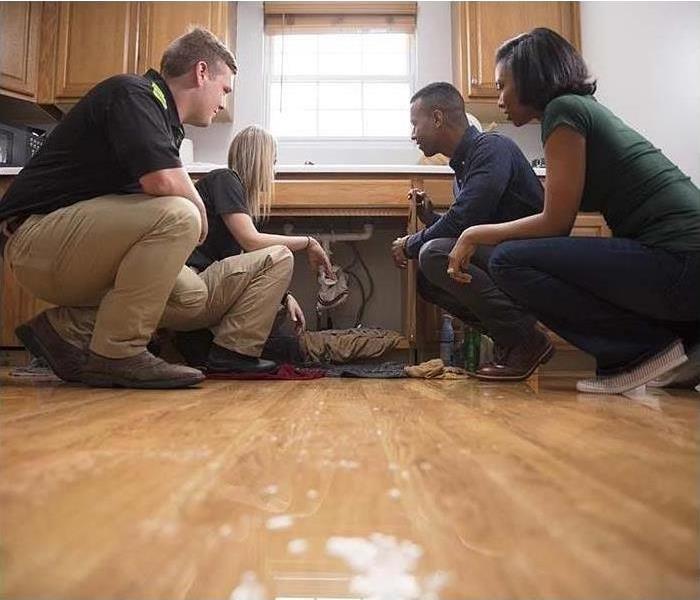 Flooding from a broken kitchen sink pipe can cause significant damage to your floors and cabinetry
Flooding from a broken kitchen sink pipe can cause significant damage to your floors and cabinetry
There are many potential sources of water damage in your home, from flooding during heavy rains to faulty plumbing. One common cause of water damage is a broken pipe. A broken pipe, especially if it goes unnoticed, can cause extensive damage. Water travels fast and can get everywhere, which means you will want to take action immediately. If your home has a broken pipe, follow these steps to resolve the problem and reduce potential damage.
Step 1: Shut Off the Water
Water from a broken pipe can flood your home with gallons of water in a fairly short amount of time. Turning off the source of water as quickly as possible can help reduce the spread water. Shut off the water in your home and leave it off until repairs can be made to the broken pipe.
Step 2: Call In a Plumber
Before using water you want to make sure the cause of the leak is fixed. Call a plumber as soon as possible to come and fix the broken pipe.
Step 3: Collect Water
If you are present when the broken pipe begins to leak water, try to catch and collect as much of the water as you can to minimize potential water damage. Use sturdy buckets or containers to collect water until the water can be shut off. Keep an eye on your buckets and switch them out when they become full.
Step 4: Remove Standing Water
If significant amounts of water have flooded your property, use buckets, mops, towels or wet vacuums to remove the water. If the standing water is too much for you to handle, call in SERVPRO of Southern McHenry County to help. We have the pumps and equipment to remove water quickly.
Step 5: Dry the Damaged Area
After removing the water, you want to ensure the space is dried completely. Wet or damp areas are great environments for mold growth. Use a dehumidifier to draw moisture out of wet materials and contents and make sure the area has good air flow.
If the water damage has extended into your walls and floors you might want to call in the professionals to make sure all areas are getting dried properly. SERVPRO of Southern McHenry has the equipment and training to dry and restore your property properly. We use dehumidifiers and air movers to speed up the drying process, and we have monitoring equipment to see the full extent of the damage and to track drying progress.
Step 6: Sanitize Areas with Contaminated Water
Water from a broken pipe is classified as clean water. This water is safe to touch and clean and doesn't require any special sanitizing techniques. However if left untreated, clean water can become contaminated after 48 hours. If your broken pipe has gone unnoticed for a few days, you may be dealing with contaminated water.
Contaminated water should be dealt with caution and needs to be dried, cleaned and sanitized properly before the area is used. Proper treatment, cleaning, and drying of properties damaged by contaminated water requires special knowledge and equipment. If you suspect water may be contaminated, be sure to give SERVPRO of Southern McHenry County a call. We know how to best identify contaminated water and we have the equipment and training to take care of it for you.
If your business experiences extensive water damage from a broken pipe, be sure to give SERVPRO of Southern McHenry County a call. We have the experience necessary to determine the source and extent of the damage. We identify and fix the root of the problem as well as the resulting damage. We work hard to restore your property as efficiently as possible.
No matter the time of day or night, we offer you the services you need. Call us 24/7 at 847-516-1600 for professional, timely service.
Preventing Water Damage To Carpets
7/30/2020 (Permalink)
Why Does Water Damage Occur In Carpets?
Water damage often occurs in carpets as a result of a leaky pipe, plumbing issues, flooding from a weather event, or buildup in places such as basements and attics that hold water. Although it’s an issue that happens rather frequently, water damage to carpets must be remedied quickly in order to prevent serious damage.
How Can I Tell If My Carpets Are Damaged?
Many times, water damage to carpets may not show any visible signs of damage. However, there are other indicators that may suggest that your carpets have, in fact, been damaged by water. If the carpet gives off a musty odor that will not subside even after cleaning or if family members living in the house experience continued symptoms of allergies or illness, these may be signs that your carpet has been damaged by water. Discoloration in any area of the carpet is a physical indicator of water damage.
What Happens If It’s Left Untreated?
It is crucial to act quickly, as the longer the moist carpet is left untreated, the more harm it may cause to the sub-floor underneath the carpet as well as to the carpet itself. In addition, mold and mildew may grow in the moist areas of the carpet after time, which cannot be cleaned and therefore, the carpet would have to be removed. Mold and mildew can contaminate the home’s air regulation system, so it must be removed as soon as possible, as it can negatively affect the health of those living in the house.
How Can I Protect My Carpet?
A wet water vacuum must be used to absorb the moisture in the carpet. It would also be wise to check furniture that surrounds the area in order to make certain that those objects have not also been damaged by water. The impacted room should be aired out, which can be achieved through opening windows and utilizing fans or a dehumidifier. When the carpet is impacted by water damage, the padding underneath will need to be replaced. Sprinkling the affected area with baking soda and then vacuuming is an effective method of treating an isolated area, as well as steam cleaning the area to get rid of dead mold spores. Cleaning other walls and carpets in the room would also help to fend against any more mold growth. To ensure a thorough elimination of any contamination, call SERVPRO.
Water Damage in My Home, What Should I Do?
7/26/2020 (Permalink)
Do you know what to do if your home suffers from water damage?
Sometimes we discover water damage in our home or business. Whether from a hot water tank or a washing machine supply line breaking, there are a few crucial steps you can take right away to mitigate the damage.
- Locate and stop the source of water flow. Shut off the valves to the source of leaking water. If needed, call a plumber or SERVPRO of Southern McHenry County. We work with plumbers and can get you the right help quickly.
- Do not turn on electrical items that may be wet. Avoid using electrical items that may have gotten wet until they have been checked and it is safe. Seeing water come through a light in your ceiling is not a good sign. You and your family's safety should come first.
- Call SERVPRO of Southern McHenry County to help determine how far the damage has spread. Water travels quickly and extensively through any vertical or horizontal surface. It can spread out on floors, go behind the baseboards and start wicking up the drywall. Damages and overall cost could increase with delayed response. The sooner you can extract water and get those surfaces drying the more you can help prevent secondary damage.
- Look at your homeowner's insurance policy and call your agent. Your insurance agent can guide you on what coverage you have, and sometimes in the case of pipe breakage or other sudden water issues, may be able to provide you with some immediate information to help you determine whether you should open a claim.
At SERVPRO of Southern McHenry County we work to provide timely care to your property to help get you back into your home as soon as possible. Our highly-trained technicians can help make the damage "Like it never even happened." Give us a call today at 847-516-1600.
Sump Pump: Water Damage
7/6/2020 (Permalink)
If you've explored other ways of keeping your basement dry — examining the grading around your home and repairing any noticeable leaks or broken pipes — and are still having trouble, it might be time to consider a sump pump.
Remember, sump pumps don't prevent water from accumulating, but they can go a long way in controlling water in your basement. Either way, your possessions stay dry, and that's the point.
Many homes have sump pits built right into the basement floor. If this is the case, all you'll need is the pump itself. If your home is not equipped with a sump pit, a drain expert or contractor should be able to tell you if it's possible to retrofit your basement.
Types of sump pumps
There are three types of pumps used in basements or crawl spaces:
- Pedestal Sump Pump: Also referred to as a "column type" or "upright" sump pump, the pedestal sump pump has an open motor that is supported on top of a column attached to the pump casing. When installed, the motor sits outside the sump and above the basement floor. The motor is not designed to be submerged in water.
- Submersible Sump Pump: This pump uses a watertight motor designed to be immersed in water, and will typically kick into action when it senses that it's become submerged. The motor is coupled directly to the pump casing and is designed to be completely hidden within the sump.
- Water-Powered Sump Pump: Water-powered sump pumps are generally much less powerful than pedestal or submersible pumps, but may have some advantage: They run on city water pressure instead of electrical power. However, because they require significant water pressure to function efficiently, they often can't be used if your city water pressure is low or limited, or if your house gets its water from a private well.
A working system
So what does a functioning sump pump system look like? There are usually three key pieces:
- A Primary Pump
- An Emergency Backup Pump (Battery- or Water-Powered)
- An Emergency Backup Pump Alarm
Because homes sometimes lose power during thunderstorms — just when an operational sump pump is critical — many pumping systems employ a backup pump. Emergency battery backup pumps work when the power goes out, when the primary pump does not remove the water fast enough, or if the primary pump fails.
In this setup, primary pumps are powered with electricity, and backup pumps are battery- or water-powered. Using two pumps instead of one makes it unlikely that both pumps will malfunction at the same time. And with the alarm system, you'll be able to tell when the primary pump has failed and the backup pump has to be used.
Is a sump pump right for you?
Installing a new sump pump system — especially if your basement doesn't already have a built-in sump pit - is an extensive, complex job. Make sure you consult with a plumbing expert.
And to find out more about particular pumps for your basement, or to check if a certain pump is certified, consult the Sump & Sewage Pump Manufacturers Association.
If you have a problem with the Stump Pump call SERVPRO of Southern McHenry County after the pump has been fixed at 847-516-1600
Source: https://www.statefarm.com/simple-insights/residence/sump-pump-basics?cmpid=SimpleInsights:Facebook:Content:17-1526298&https%3A%2F%2Fad.doubleclick.net%2Fddm%2Fclk%2F322740317%3B152524933%3By&utm_source=m.facebook.com&utm_medium=referral
How to Prepare Your Home for Winter
12/9/2019 (Permalink)
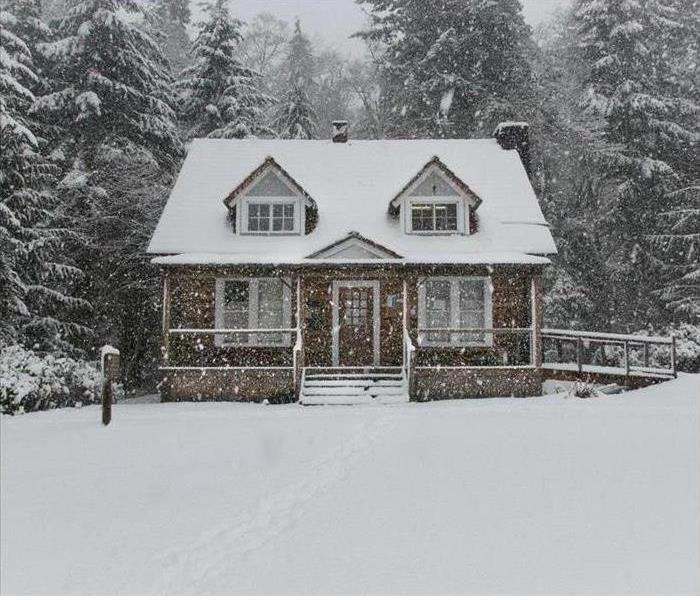 It’s time to prepare your home for colder winter months. Preparing for the change in season can help save energy and prevent costly damage.
It’s time to prepare your home for colder winter months. Preparing for the change in season can help save energy and prevent costly damage.
As winter fast approaches, it’s time to start preparing your home for the colder months of the year. Problems you may not have noticed during the rest of the year can become a bigger issue as the weather starts to shift. Properly preparing for the change in season can help you save energy and prevent costly damage.
Prepare Your Pipes
The last thing you want during the winter months is a frozen pipe. Water expands when it freezes, which can result in burst pipes, flooding, and major water damage.
Leaky pipes can lead to expensive problems if they’re left untreated when winter comes. Watch for telltale signs of leaky pipes such as unexplained high water use or water damage. If you suspect you might have a leak, get your home inspected.
If you have any pipes in unheated or uninsulated areas of your home, make sure to wrap the pipes with heat tape or pipe insulation.
If you plan to head south for the winter or go out of town for an extended period of time, you may want to consider shutting off the water completely and hiring a service to drain your pipes.
Shut Off Exterior Faucets
Don’t forget your exterior water systems. If you don’t properly drain water from your exterior faucets/pipes, they may freeze, expand, and cause damage. Disconnect garden hoses, and drain the water out of the faucets. Unless you have frost-proof faucets, you’ll need to use the shut-off valve located inside your house.
Inspect Your Heating Systems
Before the first frost, have your HVAC system inspected. This will allow you to identify potential problems early and enjoy energy savings throughout the winter months. Make sure to vacuum out the vents, replace furnace filters if needed, and check for issues like leaks, cracks, or an underperforming system.
Inspect and clean your fireplace and chimney as well. You’ll want both in top shape for those cozy nights next to the fire.
Reverse Your Fan
During the summer months, most fans turn counter clockwise, which allows the slightly angled blades to push air down. This creates a wind-chill effect, which cools down the occupants of the room.
Warm air rises, which unfortunately means the warmest part of a room is well above you. If you can force the cooler air upward, you can push the warmer air down to your level and not have to turn the heat on quite as high. If you reverse the fan to rotate clockwise, it will pull up the cooler air from the bottom of the room toward the ceiling, which will force the warmer air in the upper part of the room down.
Clear Your Gutters
It’s always a good idea to clean out the gutters, but it’s especially important right before winter. The fall months, while beautiful, come with a lot of natural debris. Unfortunately, fallen leaves, twigs, and pine needles can clog up gutters and cause ice dams and icicles in the winter. Regularly clear out the debris to prepare for winter.
Examine Your Roof
Even small leaks in your roof can cost you in both utilities and greater damage to your roof. Clear the debris off your roof, and take a look at its current condition. Watch for damaged or missing shingles, any pooled water, or other signs of potential roof damage.
Seal Your Doors and Windows
Check your weather stripping and re-caulk around doorways or windows as necessary. If gaps between siding and a window or doorframe are bigger than the width of a nickel, it’s time to re-caulk. Make sure you use caulk that’s recommended for home exterior use.
Whether you find problems while preparing your home or it sustains winter-related water damage, SERVPRO® of Southern McHenry County is here to help.
We offer 24/7 emergency service, and we can help prepare your home or restore water damage “Like it never even happened.” Call us at 847-516-1600.
Cleaning Contaminated Water Vs. Clean Water
10/17/2019 (Permalink)
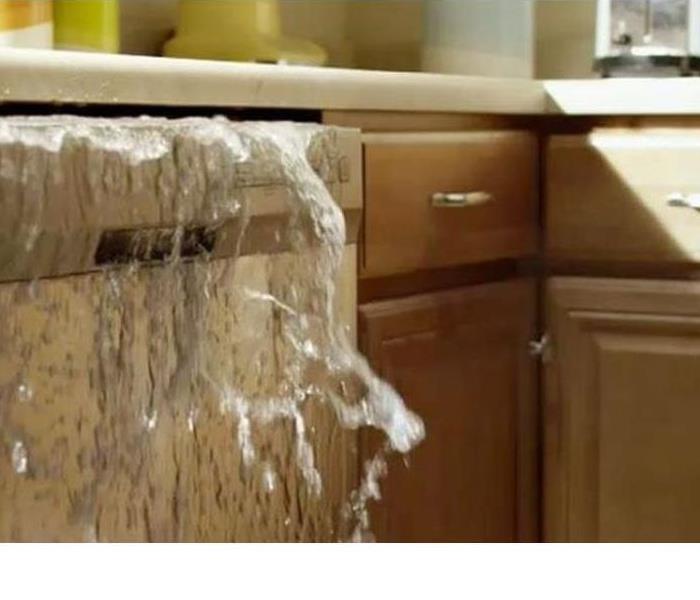 Gray water coming out of dishwasher
Gray water coming out of dishwasher
When your home in Cary, Lake In The Hills, Algonquin, Huntley, or Crystal Lake has flooded, it is important to know the difference between clean and contaminated water.
When your home or business suffers from water damage, understanding what type of water you are dealing with is critical to ensuring proper cleanup.
There are three types of water. Water is typically classified into three groups—clean, gray, and black.
- Clean Water: Clean water includes rainwater and water from broken pipes. You may also hear clean water referred to as white water. This water is safe to touch. Clean water can become gray water after around 48 hours.
- Gray Water: Gray water refers to slightly contaminated water that needs to be thoroughly treated before it is safe to consume. Sources of gray water include dishwashers, aquariums, showers, etc. It does not contain bacteria that are as harmful as those found in black water. Gray water usually progresses into black water after about 48 hours if it is not treated.
- Black Water: Black water is highly contaminated and contains harmful chemicals and biological matter. Sewage waters are considered black water. When it comes to floods, it should be assumed that all water is black water since a flood picks up contaminants along its path. Contact with black water can lead to serious illness.
Clean water is water from a broken pipe, or other water source; rainwater is also considered clean. The term gray water is used to classify slightly contaminated water. Clean water becomes gray water when it is left untreated, allowing bacteria and other contaminants to begin growing, making the water hazardous. Black water is highly contaminated and filled with fungi, bacteria, chemicals and more. Black water is typically caused by sewage damage, flooding or any type of natural disaster. Black water should always be handled by trained professionals.
Consider taking the following precautions to help minimize damage or prevent further damage while waiting for help to arrive.
Damage from Clean Water:
- Shut off the water source if possible or contact a qualified professional to do so.
- Turn off circuit breakers for wet areas of the building if access to the power distribution panel is safe from potential electrical shock. Do not enter rooms with standing water, as electrical shock hazards may exist.
- Remove as much excess water as possible by mopping and blotting. Wipe excess water from wood furniture.
- Remove and prop up wet upholstery cushions to allow more even drying.
- Start drying the affected area and keep in mind that clean water becomes contaminated after about 48 hours.
Damage from Contaminated Water:
- Avoid all contact with sewage and items contaminated by sewage. Wash your hands thoroughly if you come in contact with contaminated items.
- Do not walk through contaminated areas, as you could spread damage to unaffected areas.
- Do not turn on the HVAC system if there is a possibility of spreading contaminated air.
- Do not use household fans to dry the structure; airflow could spread contaminants.
- Discard any food and/or products for personal hygiene and cleanliness if exposed to the contaminated areas.
When you have water damage, don’t leave your property to chance. Call SERVPRO of Southern McHenry County. We will properly clean and dry your property and ensure it is safe.
The Flooring Types SERVPRO Encounters When Doing Water Damage Mitigation
8/5/2019 (Permalink)
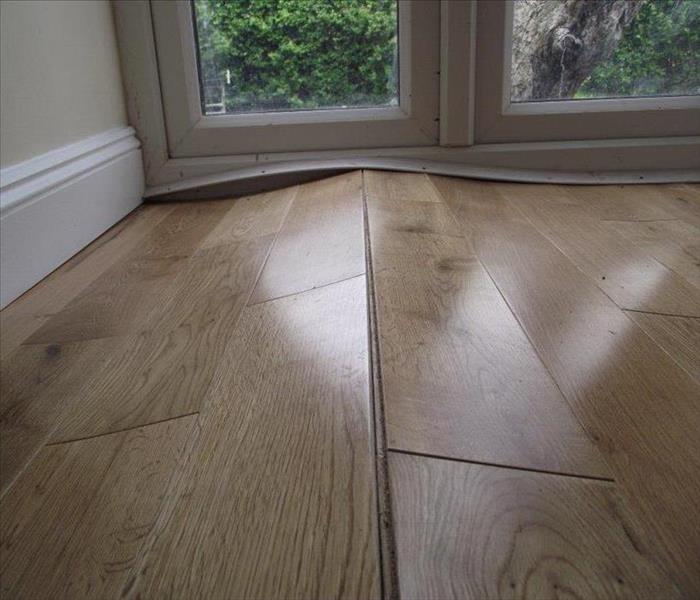 Wet Laminate Flooring
Wet Laminate Flooring
SERVPRO encounters many types of flooring when servicing water damage losses. There are many variables that determine if the flooring can be saved. Since the arrival of laminate flooring in 1977 and the many new options and trends in flooring we are seeing less carpet.
The first factor in determining if SERVPRO can save your floor is if the water source is clean water or black water. Any water that is contaminated such as water from a drain back up, flooding or water damage that has sat for over three days is considered black water. In all these scenarios the flooring would be removed and disposed of.
If the water is clean and the incident has happened in the last several days, these are the determining factors in saving your floor:
- Laminate Flooring – When water gets under laminate flooring, It will need to be removed and replaced with new flooring.
- Carpet – Most times carpet can be saved. SERVPRO would extract the water and remove all of the wet pad. Dehumidifiers and air movers would be placed and monitored until the drying is complete. The pad would then be replaced, and the carpet would be re-installed and cleaned
- Wood Floors – SERPVRO uses floor drying mats that can be successful in drying wood floors. The amount of water and the type of wood flooring is an important factor on saving a wood floor.
- Ceramic Tile – The determining factor for saving ceramic tile floors is what is under the floor. If the tile floor is laid over vinyl the floor cannot be saved.
Call SERVPRO of Southern McHenry County and we can assist you with your water loss and determine if your floor can be saved. Call 847-516-1600.
The Science of Drying a Water Damage
7/30/2019 (Permalink)
 Equipment used with Science of Drying
Equipment used with Science of Drying
Did you know there is actually a science behind the process of drying? Having the knowledge of Psychrometrics and IICRC S500 guidelines is essential to restoring a water-damaged structure to its preloss condition. If your home or business suffers a water damage, we will:
- Inspect the property to detect every component that is wet to help prevent secondary damage from happening.
• Measure how much moisture is in wet materials and monitor whether the materials are drying properly.
• Set up professional drying equipment, including equipment to help dry hardwood floors, tough-to-reach spaces inside walls, and much more.
• Use monitoring equipment and a proven scientific process to help speed the drying of your home or business.
If you need help with a water damage call SERVPRO® of Southern McHenry County today at
847-516-1600.
Hail Storm What to Check After
7/28/2019 (Permalink)
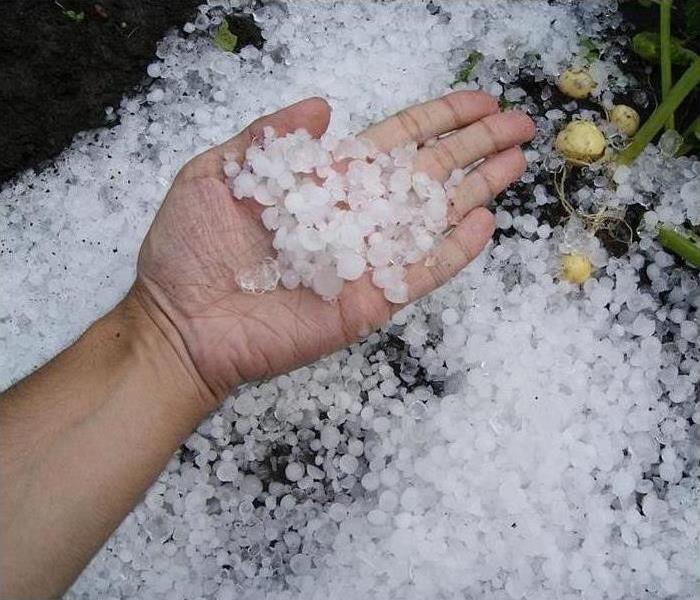 hail from a storm in Cary
hail from a storm in Cary
While hail is a pretty cool phenomenon when seen on TV or from afar, it’s a scary and many times dangerous situation when experienced first hand. These frozen balls of ice falling from the sky can cause a lot of damage to cars, businesses, and homes. So if you should experience a hail storm, the first step is to take immediate cover. Once the storm has passed, it’s then a good time to check your property for damage. Below we will cover common areas to check around your home and business for damage from hail.
The Damage Hail Can Cause
When it comes to hail damage, the first thing many people think of is cars. We’ve all seen the news stories where cars are pelted with hail during a storm creating little dents in the car hoods and roofs. But what most people don’t think about is that if hail can cause that damage to metal, imagine what it can do to a home or business?
Check the Roof
One of the most common damages from hail is damage to a roof. The hail can tear up the shingles of a home resulting in roof leaks. Even if there are no signs of leaks from the roof damage, you may still want to check for any dings or pot marks in the shingles. If there is enough damage, many times the insurance company will cover the damages due to the hail storm.
Check the Siding
Another common area of homes that hail can damage is the siding. This is particularly true with old, brittle siding. If the hail storm brings with it high winds, the hail can be blown into the siding of homes rather than dropping straight down. The hail can tear apart the shingles causing water to seep into the exterior walls resulting in water damage to the insulation, the wood framing, and eventually into the drywall.
Check the Windows
Again, if the hail storm has severe winds, the hail can be blown into windows and doors causing glass cracks or breaks. Even if the windows and doors are broken, the hail can also cause damage to the seals around the windows and glass which can lead to water seeping into the home. It’s always a good idea to do a thorough check of all the windows and doors that were hit by hail for any damages.
Check the Air Conditioner
Luckily there’s only one major appliance that is found on the outside of the home. That is the air conditioner. While air conditioners are usually built to withstand the brutal Indiana seasonal weather, large and damaging hail storms is one thing that air conditioners may not be able to stand. The hail can damage the cooling coils of the air conditioner. The coils are usually protected by a wire cage to can block objects from hitting the coils directly, hail is usually small enough that it can pass by the cage and cause direct damage to the coils. In severe hail storms, hail can also damage any wires or power supplies to the air conditioner. Again, it’s always a good idea to check the air conditioner and make sure nothing has been blown into it during the storm or been damaged from the hail.
Check the Gutters
Not only can hail dent and ding the gutter system, it can also cause further damage from the weight of the hail piling up into the gutter system. It’s not uncommon to see a gutter system pulled or torn away from a home due to the excessive weight of the hail piling up in the gutters. If you are up on the roof to check for damage to the shingles, you can also check the gutters for damage too. Look for dents in the gutter systems and areas where the gutter is drooping or even pulled away from the house.
Call the Hail & Storm Damage Cleanup Experts
If you should suffer hail and storm damage to your home, call the cleanup experts at SERVPRO of Southern McHenry County. They have the knowledge and expertise to handle any type of storm damage. With their extensive training and state-of-the-art equipment, the pros at SERVPRO of Southern McHenry County can handle water and mold damage that can result from heavy hail storms, wind damage, and flooding. 847-516-1600
Sometimes Water Damage Can't Be Prevented From Occurring In Your Cary/Algonquin/Lake in the Hills Homes
7/23/2019 (Permalink)
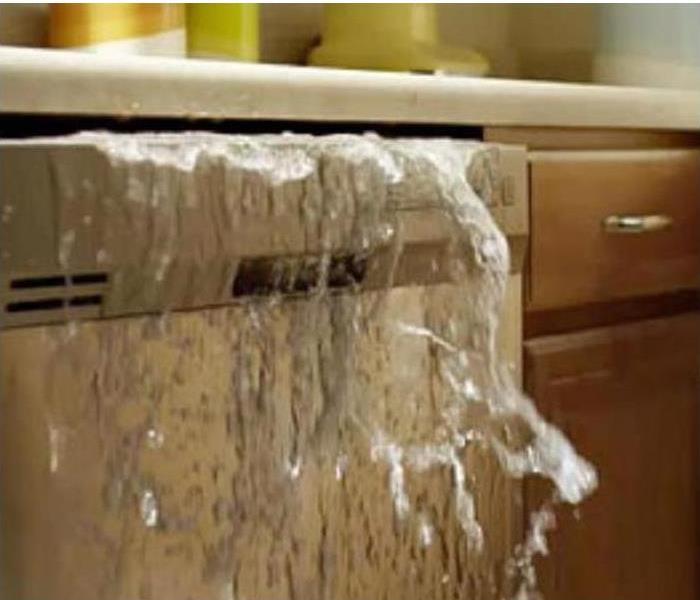 Water damage to Cary/Lake in the Hills/Algonquin homes can happen anytime
Water damage to Cary/Lake in the Hills/Algonquin homes can happen anytime
The new iPhone 7 may be waterproof but just like a home, water can find a way into it. With flooding, cracked pipes, a leaky roof, or a broken sump pump; water can find a way into your home and damage it. And hopefully just as you have insurance for your mobile phone, you also have insurance for your home.
If your home does happen to suffer from water damage, you can trust the experts at SERVPRO of Southern McHenry County to clean up the damage before more has occurred. At SERVPRO of Southern McHenry County we have the knowledge and experience to handle all types of water damage. Whether it is from a flood, a backed up sewer, a roof leak, or a frozen pipe that has burst; we have the specialized equipment and professional-grade products to quickly remove the water from your home. Once the water is removed, we'll then focus on completely drying out any remaining water and moisture in the damaged areas. We'll also remove and treat any areas that may promote mold growth.
The Hidden Danger of Water Damage
While unwanted water in a home can certainly cause damage to drywall, wood floors, furniture, clothes, and other porous materials; it's the mold growth that the water promotes that can cause the most damage. Not only can mold cause substantial damage to one's home but also to one's health. That is why it is imperative to seek water and mold remediation professionals immediately after water damage has occurred. Water and mold remediation professionals, like those at SERVPRO of Southern McHenry County, will work quickly to remove all water and moisture from the affected area. They will then clean and treat the area to prevent mold growth from occurring. Once the area has been completely dried and has been inspected to make sure there are no mold spores or signs of mold growth, then the damaged area can be repaired. This can include replacing the drywall, carpeting, wood floors, and sometimes subfloor depending on how long the water damage has existed.
Call the Water & Mold Damage Experts
Hopefully, you have caught the water damage early and it can be quickly remedied. But if you do have long-term water damage from a leaky pipe or roof, we have the expertise and the tools at SERVPRO of Southern McHenry County to make it "Like it never even happened." The moment you experience or spot water damage in your home, call us anytime at 847-516-1600. Our highly trained technicians will respond immediately to your residential or commercial emergency. Whether you're in Indianapolis or the surrounding communities, we'll be there faster to your disaster than any other.
Reduce the Risk of Water & Mold Damage with these Springtime Tips
5/14/2019 (Permalink)
Reduce the Risk of Water & Mold Damage with these Springtime Tips
Winter is Over. Did Your Home Survive?
Springtime is upon us in Illinois. It’s time to start thinking about planting some flowers and getting your lawn mower ready to start the long mowing season. There are lots to look forward to in the spring but there are also lots of things that need to be done to make sure your home is up for the season. Below we cover five things to check in your home to make sure it is free of water damage and mold damage - and ready for springtime.
#1 Check Around Your Windows & Doors
During the winter, water can seep into cracks around your windows and doors and freeze. The freezing water can expand causing the tiny cracks to grow to allow more water to enter into your home. Check around the outside and inside of all your windows and doors. Look for cracked or missing caulking. If you find any cracks where water could enter your home, be sure to caulk or seal the holes.
#2 Check Your HVAC System
As the warm weather approaches, you need to make sure your air conditioner is ready. The first thing to check and most likely replace is the air filter. The air filter catches allergens and reduces the buildup of dust in your home’s air ducts. You should also make sure that there is no standing water or dirty air coils where mold can grow and then be pushed through the air ducts.
#3 Check Your Roof for Damage
When it’s nice out and your roof is dry, climb up there and do an inspection. Check to make sure your gutters are clear. Otherwise, water could run over the gutters and cause water to enter through your foundation and into your basement. Also, check to make sure there are no missing shingles. If you have exhaust pipes or chimneys, check around them to make sure they are sealed and there are no signs of cracking.
#4 Check Attics, Basements and Crawl Spaces for Mold
As the ground thaws out from the Winter, water make find its way into your crawl spaces and/or basements. If you have any roof damage, it could seep into your attics. Make sure to check all these areas for any signs of water. This could be standing water or water stains. If your basement or crawl space smells musty, then you may want to get a dehumidifier to remove the excess moisture from the area before it leads to mold growth. If you do find mold growth or water that you can’t remove, then call the professionals at SERVPRO of Southern McHenry County to help remediate the mold damage.
#5 Check Exposed Water Pipes
If you have water pipes in your basement, crawl space, and/or crawl space that you can see, make sure to check them for any drips around the joints. During the winter, these pipes could have frozen causing the pipes to expand and crack. Even a small drip can lead to extensive water damage and/or mold growth. It’s also a good idea to check any external faucets for cracks or leaks. If you find any sign of leaks, make sure to have it fixed before it leads to even worse damage.
Enjoy a Stress-Free Spring
While you can’t completely reduce the risk of water damage to your home, you can lower the risk by following the five steps mentioned above. If you should experience water damage or find mold growth when inspecting your home, contact SERVPRO of Southern McHenry County call them at 847-516-1600 to help clean up the damage and restore your home.
Tips to Prevent and Protect Pipes from Freezing During The Winter
12/11/2018 (Permalink)
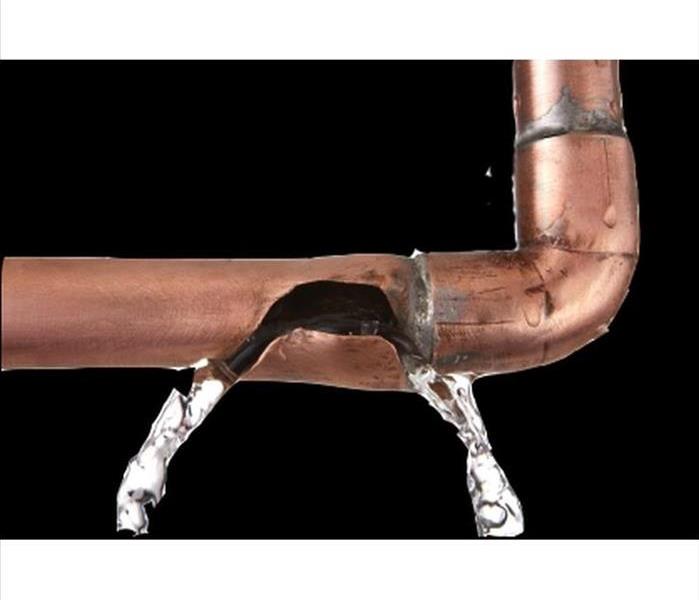 Tips to Prevent and Protect Pipes from Freezing
Tips to Prevent and Protect Pipes from Freezing
Why Pipe Freezing is Such a Problem
Water has a unique property going from a liquid to a solid it expands as it freezes. This expansion causes tremendous pressure on whatever is containing it, including metal or plastic pipes. No matter the strength of a container, expanding water can cause pipes to break.
Most frequently pipes that freeze are:
Pipes that are exposed to severe cold, like outdoor water faucets, swimming pool supply lines, and water sprinkler lines.
Water supply pipes in unheated interior areas like basements and crawl spaces, attics, garages, or kitchen cabinets.
Pipes that run against exterior walls that have little or no insulation.
How to Help Pipes From Freezing
Before the onset of cold weather, protect your pipes from freezing by following these recommendations:
Drain water from swimming pool and water sprinkler supply lines following manufacturer's or installer's directions. Do not put antifreeze in these lines unless directed. Antifreeze is environmentally harmful, and is dangerous to humans, pets, wildlife, and landscaping.
Remove, drain, and store hoses used outdoors. Close inside valves supplying outdoor hose bibs. Open the outside hose bibs to allow water to drain. Keep the outside valve open so that any water remaining in the pipe can expand without causing the pipe to break.
Add insulation to attics, basements and crawl spaces. Insulation will maintain higher temperatures in these areas.
Check around the home for other areas where water supply lines are located in unheated areas. Look in the garage, and under kitchen and bathroom cabinets. Both hot and cold water pipes in these areas should be insulated.
Consider installing specific products made to insulate water pipes like a "pipe sleeve" or installing UL-listed "heat tape," "heat cable," or similar materials on exposed water pipes.
Consider relocating exposed pipes to provide increased protection from freezing.
How to Prevent Frozen Pipes
Keep garage doors closed if there are water supply lines in the garage.
Open bathroom and kitchen cabinet doors to allow warmer air to circulate around the plumbing. When the weather is very cold outside, let the cold water drip from the faucet served by exposed pipes. Running water through the pipe - even at a trickle - helps prevent pipes from freezing.
Keep the thermostat set to the same temperature both during the day and at night. By temporarily suspending the use of lower nighttime temperatures, you may incur a higher heating bill, but you can prevent a much more costly repair job if pipes freeze and burst.
If you will be going away during cold weather, leave the heat on in your home, set to a temperature no lower than 55° F.
If there should be a pipe burst call SERVPRO of Southern McHenry County at 847-516-1600.
3 Places Water Leaks Could be Hiding in Your Home In Southern McHenry County
7/11/2018 (Permalink)
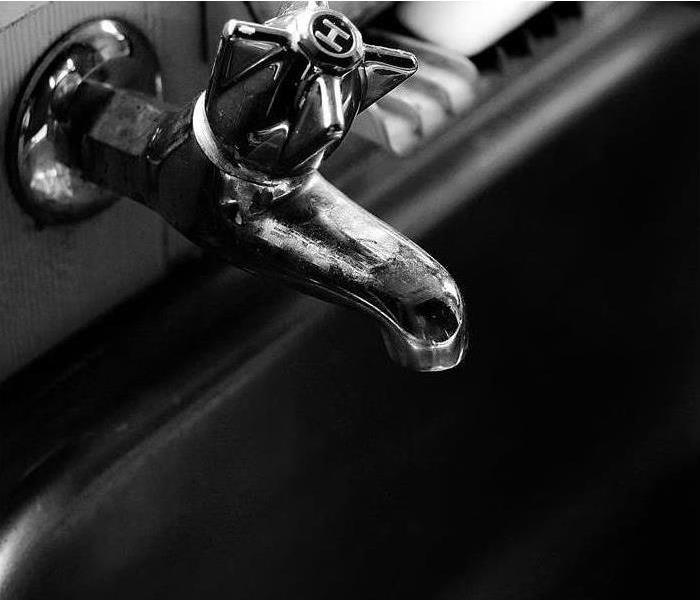 Check these areas to make sure water is not damaging your home!
Check these areas to make sure water is not damaging your home!
If you are a homeowner in Cary or Algonquin, you know the danger that water damage can cause to your house. Sneaky leaks and unforeseen plumbing problems can cost you more than an increased water bill. They can cause massive damage to your home, and repairs can be in the thousands of dollars. Last year, almost 40 percent of homes suffered some sort of water damage, ranging from a frozen pipe bursting to leaky roofs. Out of these 40 percent of homes, 93 percent of the incidents could have been prevented! Read through this article to find out 3 of the most common ways that water damage can be in your home, without your knowledge! If you do find damage from water in your home, give SERVPRO of Southern McHenry County a call. We can give you a quote for water damage restoration, and help you get through the pain of water damage.
Leaky Pump Valves
One of the most common ways that water leaks can happen in your home, comes from the pumps that are in your shower or central air system. These pumps, while rugged, are not impervious to wear and tear. The valves in them often go for years without service, and by the time you can see the damage that they've caused, it is often too late. The water seeping out of the valves can cause floorboards to be destroyed, or cause mold to grow around the area of the pump. The best practice is to give a water restoration company a call and have them assess the damage.
Leaks from the Bathtub
Another sneaky way that water can damage your home, comes from your bathtub. If the watertight seal around the tub is somehow broken, not all the water from your long shower or bath will end up down the drain. It may take a few days to finally notice, but that notice will be shocking. If you have an upstairs bathroom, that notice may come in the form of water dripping from your ceiling, right before the ceiling begins to sink down from the added weight of the water. If your bathroom is downstairs, you may not notice the leak for a longer period of time, allowing for the water under the bathtub to eat away at wood flooring. The worst outcome from the leaking bathtub is that mold growth is almost inevitable!
Hidden Toilet Leaks
Toilet leaks are some of the most common leaks that happen in a home. This makes them the most important place to watch for a runaway leak, and one of the most important places to have inspected by SERVPRO of Southern McHenry County. Toilet leaks that are not immediately visible to the homeowner can cause massive damage over a long period of time, much like the bathtub leaks mentioned above. A leaking gasket or valve can cause water to pool under the toilet fixture, eating away at the floor of your home.
If you think you might have a leaking valve, give SERVPRO of Southern McHenry County a call. They can inspect your home for potential leaks, and evaluate the risk these leaks can pose to your home.
Understanding the Three Categories of Water
6/1/2018 (Permalink)
When dealing with water damage in your home or business, there are three different types or classifications of water that we use: Clean, Gray, and Black water.
Clean Water: This is water that does not contain contaminants. It includes broken water lines, malfunctioning appliances, and toilets holding tanks, snow melt and rainwater. Overtime however, clean water can progress and become gray water within 48 hours, if left untreated.
Gray Water: Gray water does contain slight chemical or biological contaminants, and may pose a health risk. Gray water can discharge from dishwashers, washing machines, sinks, showers, aquariums and waterbeds, or come from a clean water source that leaked through a ceiling. It can also be clean water that was left untreated (and became gray water). Gray water can also progress to the next stage (Black Water) if left untreated within 48 hours.
Black Water: This water is a positive health risk as it is highly contaminated. Black water is presumed to contain multiple potentially harmful contaminants including fungi, bacteria, chemicals, viruses, and more. Black Water is typically caused by sewage damage, flooding, or any type of natural disaster. Black water should always be treated by a trained and certified professional.
For any type of water damage, it is always best to treat it quickly so as to avoid further contamination and risk mold growth. Call SERVPRO of Southern McHenry County if you need services in your home or business.
Available 24/7
847-516-1600
What is Tenant, Renters Insurance? Water damage in Southern McHenry County
5/27/2018 (Permalink)
 What is Tenant, Renters Insurance? Water damage in Southern McHenry County
What is Tenant, Renters Insurance? Water damage in Southern McHenry County
What is Tenant, Renters Insurance? Water damage in Southern McHenry County
What is Tenant, Renters Insurance? Water damage in Southern McHenry County
Many renters are under the impression that their landlord’s insurance policy will cover their belongings, unfortunately that generally is not the case. Your landlord’s policy covers the building itself, but it may not include your personal belongings, and may not cover injuries sustained within the structure. That’s where renters insurance comes in.
Renters insurance protects your personal property in a rented apartment, condo or home from unexpected circumstances such as theft, a fire or sewer backup damage – and will pay you for lost or damaged possessions. It can also help protect you from liability if someone is injured on your property.
Renters insurance is similar in scope to homeowners insurance, with the exception that it does not provide coverage for the dwelling itself or other structures.
How does Tenant, renters insurance work?
If you experience a covered loss in your rented space, renters insurance can help to cover the associated costs. The amount covered will depend on the type of loss that occurred and the amount of coverage you have.
There are two types of coverage options under a typical renter’s policy: Actual Cash Value coverage and Replacement Cost coverage. Here’s the difference between the two:
- Actual Cash Value coverage will reimburse you for the value of the items at the time of the damage or loss.
- Replacement Cost coverage covers the cost it takes to replace the items lost or damaged.
What does Tenant, renters insurance cover?
A renter’s insurance policy offers you coverage for the loss or destruction of your personal belongings in the event of a covered peril such as:
- Fire
- Lightning
- Windstorm
- Hail
- A frozen plumbing system
- Theft
- Vandalism
- Impact by a vehicle
Renters insurance may also cover you if:
You are forced to temporarily move out of your home: In the event your home becomes unlivable due to damage caused by a covered instance such as a fire or vandalism, renters insurance can help cover the cost of alternative living arrangements while your home is repaired or rebuilt.
A person is injured on your property and requires medical attention: Personal liability coverage is designed to protect you, as well as other individuals who visit your home, if an accident were to occur. This type of coverage will help pay for medical costs and legal fees that you could end up incurring.
Items you keep inside your car are damaged or lost: Depending on your renter’s insurance policy, you may be covered for belongings that you keep inside your car. Note that this coverage does not include equipment or systems installed in the car.
What does Tenant, renters insurance not cover?
Now that you have a basic idea of what renters insurance covers, it’s important to understand what a basic renter’s insurance policy does not cover so that you’re prepared:
- Valuables. Expensive collectables and valuables such as jewelry may not be covered under a basic renter’s policy and may require additional coverage.
- Home business. Operating a small business out of your home doesn’t mean it will be covered by your renters insurance. For instance, if your business laptop is stolen from your apartment, there’s a chance it could be considered business property and therefore, won’t be completely covered by your renters insurance. Check with your provider to see if your policy covers a home business or if you need additional coverage.
- Motorized vehicles. Use or ownership of a motor vehicle will not be covered by your renters insurance even if it is parked on your property (this also applies to aircraft and specific watercraft). Personal belongings kept inside the vehicle, however, are typically covered.
Also, remember to always make sure to thoroughly read through your policy so that you have an understanding of what is and isn’t covered.
For any type of water damage, it is always best to treat it quickly so as to avoid further contamination and risk mold growth. Call SERVPRO of Southern McHenry County if you need services in your home!
Available 24/7 847-516-1600
What is a Sewer Backup?
5/1/2018 (Permalink)
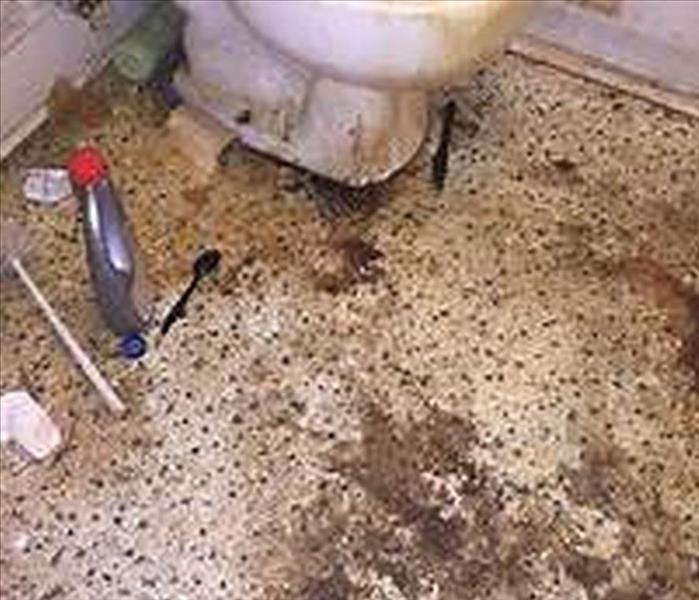 Sewage Backup In a Bathroom
Sewage Backup In a Bathroom
While floods are probably best known for causing extensive water damage to homes and businesses, they can also cause sewage from sanitary sewer lines to back up into houses through drain pipes. These backups not only cause damage that is difficult and expensive to repair, but also create health hazards.
Most homeowners and business owners may not realize that they are responsible for the maintenance and repair of their house or sewer lateral – the pipeline between the city sanitary sewer main, usually located under the street, and the building. The sewer lateral is owned and maintained by the property owner including any part that may extend into the street or public right of way. A cracked or deteriorated lateral or one filled with tree roots can allow groundwater to seep into the system, contributing to the possible sewer backup problems.
A sewer backup can lead to disease, destruction of your valuables, damage to your house or business, and can even result in electrical malfunctions. Prompt cleanup of the affected property can help minimize the inconvenience and prevent mold and further damage.
That’s where SERVPRO of Southern McHenry County can help 24 hours a day, 7 days a week. Sewage backup should be considered an emergency and dealt with as quickly as possible. We are the water damage restoration specialists with specific training and expertise to safely restore your home or business in Cary, Fox River Grove, Algonquin, Lake in the Hills, Crystal lake, Marengo, Huntley, Union or Woodstock.
What does a Property Inspector Check For, and What is Not Included
4/1/2018 (Permalink)
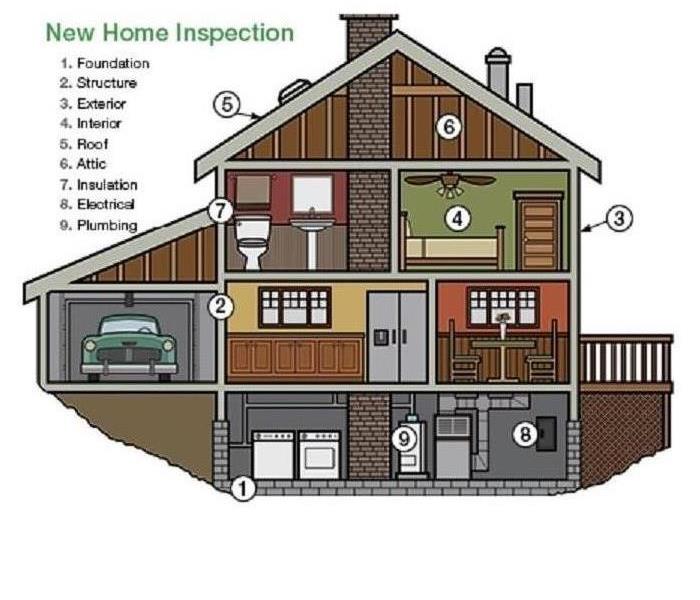 Areas for Inspection
Areas for Inspection
What a Property Inspector Check For, and what is not included, water damage in your Southern McHenry County home.
A property is probably the biggest purchase you'll ever make, so when you buy a property it's important to be sure your potential new property has a proper inspection before you sign the papers. Getting a qualified home inspector can be an important first step.
A home inspector is a qualified professional who visually inspects the structure and components of a home and looks for any immediate or potential problems. They provide a written report to you with a description of problem areas and may also include recommendations for further evaluation.
You can go over the report with your real estate agent to decide how the results may affect the purchase of your potential home.
What they inspect
Home inspection requirements vary greatly from state to state, but the American Society of Home Inspectors (ASHI) has a Standards of Practice page that outlines minimum and uniform standards that you should expect from an inspection. They include the following:
- Structural elements: Construction of visible foundation, evidence of sagging or bowing of the structure, and window alignment
- Safety: Operating fire and carbon monoxide alarms, fire sprinklers, condition of stairs, hand and guardrails, and garage door openers.
- Grounds: Leaks from septic tank, proper drainage, and condition of the house's driveways, fences, and sidewalks
- Roof: Condition of shingles, any repairs/patches to flat roofs, clear vents, damage to chimneys, and properly working gutters
- Exterior surfaces: Correct clearance between ground and siding material, condition of exterior paint or siding, and properly working lights and electrical outlets
- Attic: Sufficient insulation, proper ventilation, and any sign of leaking or water damage
- Interior plumbing: No damaged or leaking pipes, proper hot water temperature, as well as functioning toilets, sinks, bathtubs, and showers
- Electrical system: Up-to-code condition and type of visible wiring, and proper function of circuit breakers, outlets, light fixtures, and fans
- Appliances: Proper function of stove, dishwasher, refrigerator, microwave, washer and dryer, and all other appliances
- Heating and cooling systems: Condition of furnace, air conditioning (temperature permitting), water heater, chimney, and fireplace
- Basement: Solid foundation, walls, and floors, with no signs of water intrusion or damage
- Garage: Solid foundation, windows, ceiling, framing, and roof; working garage door opener; up-to-code electrical system; and proper function of outlets
What they don't inspect
Again, while there is variation of what home inspectors look for, there are areas that are generally not covered by a home inspection. If you suspect any problems or concerns in the following areas, you may want to schedule an evaluation by a certified specialist:
- Pest control
- Swimming pools
- Asbestos
- Radon gas
- Lead paint
- Toxic mold
What will it cost?
The inspection fee for a typical one-family house varies geographically, as does the cost of housing. Similarly, within a given area, the inspection fee may vary depending on a number of factors such as the size of the house, its age and possible optional services such as septic, well or radon testing.
Do not let cost be a factor in deciding whether or not to have a home inspection or in the selection of your home inspector. The sense of security and knowledge gained from an inspection is well worth the cost, and the lowest-priced inspection is not necessarily a bargain. Use the inspector’s qualifications, including experience, training, and compliance with your state’s regulations, if any, and professional affiliations as a guide.
Why can't I do it myself?
Even the most experienced homeowner lacks the knowledge and expertise of a professional home inspector. An inspector is familiar with the elements of home construction, proper installation, maintenance and home safety. He or she knows how the home’s systems and components are intended to function together, as well as why they fail.
Above all, most buyers find it difficult to remain completely objective and unemotional about the house they really want, and this may have an effect on their judgment. For accurate information, it is best to obtain an impartial, third-party opinion by a professional in the field of home inspection.
Finding a home inspector
Be sure you are comfortable with your choice of home inspector. They are extremely important and can help you detect and avoid major pitfalls in the home buying process.
- Talk to your real estate professional. They may be able to recommend a home inspector that they have worked with in the past and trust.
- Ask friends and family. If you know anyone who has recently gone through the home buying process, they may have a good recommendation.
- Look for accredited affiliations. Consumers should look for an inspector who has an affiliation with groups such as the National Institute of Building Inspectors, the American Society of Home Inspectors, and the International Society of Certified Home Inspectors. These are some of the most reputable inspector associations, and their Web sites have a 'find an inspector' service to locate a member in your area.
Sources:
American Society of Home Inspectors (ASHI) National Institute of Building Inspectors International Society of Certified Home Inspectors
Condo Association and Insurance. Who Covers You?
3/1/2018 (Permalink)
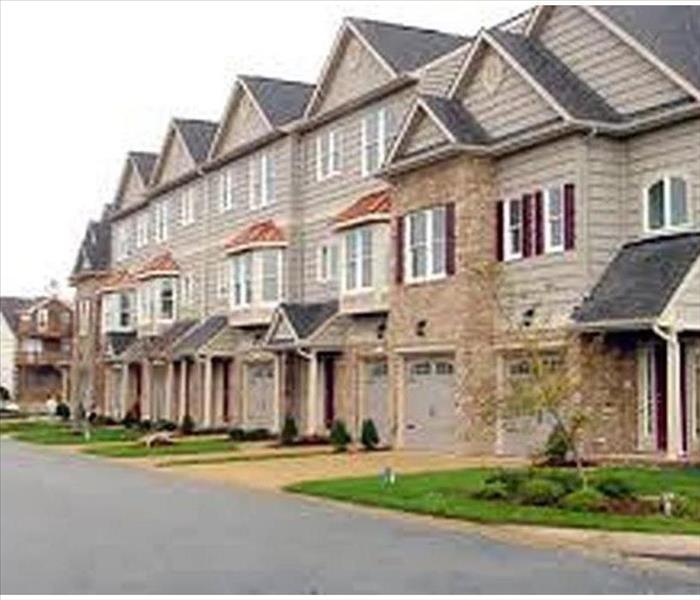 Condos
Condos
Condo Association and Insurance. Who Covers You?
Before filing an insurance claim, condo owners must determine who is liable for water damage. Determining who is responsible or liable for condo water damage can be pretty tricky, and is dependent upon the cause of the damage. A Condo Association maintains insurance to cover common areas in the complex, and individual condo insurance policies cover the interiors of individual units, such as walls and floors.
When a water damage occurs in a condo, it does not matter where the water came from. Keep in mind that each unit owner is responsible for their own unit. The HOA is also responsible for the repairs and dry out or clean up. Before filing an insurance claim, condo owners should contact a restoration company to perform an assessment. A professional restoration company will be able to assist the homeowner and the association to coordinate the cleanup and repairs. Condo owners should also review their individual condo coverage and determine what is covered by whom. If the water damage was caused by a pipe that burst in the kitchen, the claim will most likely be covered by your own individual insurance. If the water damage was caused by another unit, that will be a little tricky. This is why it’s very important for every condo owner to be informed of their condo association’s master policy and their personal condo coverage, inside out!
Toxic mold growth can start within 48 hours of the water damage, if you notice any water damage either coming from your unit or another unit, notify us SERVPRO of Southern McHenry County and your condo association and inform them of what is going on. When dealing with the condo association, be persistent and make sure you receive an immediate response, especially if the water damage has made your unit uninhabitable.
Contact SERVPRO of Southern McHenry County at 847-516-1600.
Ice Damming on Homes
1/7/2018 (Permalink)
 Serious Ice Damming
Serious Ice Damming
Ice dams occur on heated buildings with sloping roofs in cold climates with deep snow accumulation. Ice dams on roofs form when accumulated snow forms an insulating layer under cold conditions that would cause the freezing point to be within the snow layer, if it were not subject to melting. Instead, building heat coming through the roof's surface melts the snow resting on it. This causes meltwater to flow down the roof, until it reaches below a place on the roof's surface that is below freezing—typically at the eaves where there is no building heat. When the meltwater reaches the frozen surface, ice accumulates, growing a barrier that impedes further passage of meltwater off the roof. Ice dams may result in leaks through the roofing material, possibly resulting in damaged ceilings, walls, roof structure and insulation, damage or injury when the ice dam falls off or from attempts to remove ice dams.
The melting of roof snow comes from the combination of three basic causes:
- Air temperatures well below freezing.
- A thick layer of dry snow, which has good insulating capabilities.
- Heat from the building coming through the roof.
Winter Freeze Checklist for Your Southern McHenry County
12/1/2017 (Permalink)
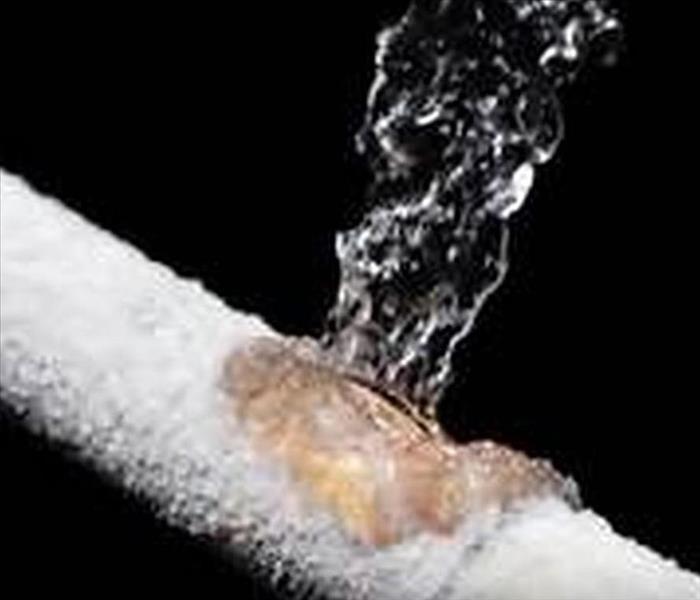 Frozen Pipe Leaking
Frozen Pipe Leaking
Winter Freeze Checklist
Winter season is upon us, it brings along with it one the most common water issues frozen pipes.
As soon as thermometers drop into the freezing zone, the following tips will help you avoid unpleasant surprises that may come from broken water pipes on your property. When it freezes, water in a pipe expands. This creates pressure on the pipe and could cause it to break, regardless if it is plastic or metal. Pipes that freeze most frequently are swimming pool feeder lines, outdoor hose bibs, and water supply lines and unheated interior areas like basements, attics, garages and crawl spaces. As well, pipes that run against exterior walls that have little or no insulation are also subject to freezing.
We are happy to give you this Winter Freeze Checklist so that you can relax and enjoy this holiday season. Winters can be harsh on household plumbing so don’t forget to protect the water meter and pipes from freezing temperatures. Those located on outside walls, in basements or in crawl spaces, are particularly vulnerable to the cold. They can easily freeze and break during cold spells and lead to costly repairs. Please follow these important steps to help prevent expensive problems later.
- Disconnect and drain the garden hose connection. This will help prevent outside faucets and pipes from freezing, leaking or breaking.
- If there are water supply lines in the garage, keep it closed and seal air leaks.
- Close outside vents, crawl spaces and doors so cold air doesn’t seep inside.
- Repair broken windows and seal cracks in the walls.
- Insulate, Insulate, Insulate
- Open you the cabinet doors in your kitchen and bathroom to allow warmer air to circulate around the plumbing.
- Wrap water lines and meters in commercial insulation.
- When the weather is very cold outside, let the cold water drip from the faucet served by exposed pipes. Running water through the pipe - even at a trickle - helps prevent pipes from freezing.
- Wrap pipes subject to cold or freezing in heat tape available from hardware stores. It must be kept plugged in all winter.
- Locate The Shut-off Valves
- Make sure the valves on either side of the water meter are working properly.
- Place a tag on the main shut-off valve. Make sure everyone in the house knows where it is and how to operate it in an emergency.
- Check The Heat
- If you’re going away, keep a minimum amount of heat on in the house. This will help protect the pipes in case the temperature drops.
- If you plan to turn the heat off, drain all the water from the pipes, toilets and water heater. Turn off the power source to the water heater. If your heater operates on gas, turn the heater on “pilot.”
If you have any questions or you need emergency services call us at 847-516-1600.
Dishwasher Leaks and Floor Damage Repair
8/15/2017 (Permalink)
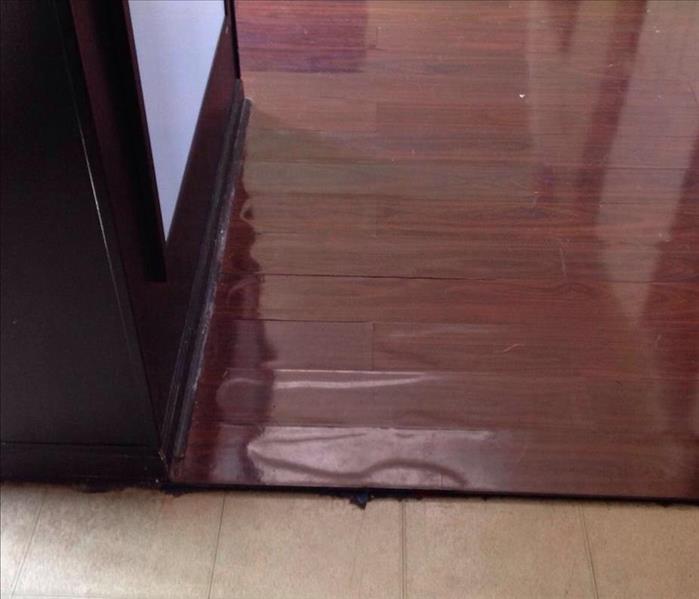 Damage to Wood floors because Dishwasher Leak
Damage to Wood floors because Dishwasher Leak
For some people, dishwasher leaks start as a slow drip that may not be immediately noticed. Others discover dishwasher leaks as soap suds bubble their way across the kitchen floor.
Dishwasher leaks and floor damage repair often go hand in hand. Stopping leaks before they cause damage is ideal, but depending on the situation, is not always possible.
Dishwasher Leaks and Floor Damage Repair
My dishwasher is leaking! What do I do now?
Time is critical when it comes to a water leak of any type. The faster you respond and take action to stop water from spilling onto your kitchen floor, the less damage that will be done – and that means less costly repairs!
What to do When Your Dishwasher Leaks
- If your dishwasher is leaking a significant amount of water, first turn off the dish washing cycle. For small leaks, it may be possible to capture the water with a towel or bowl and let the cycle finish first, but this is generally not recommended.
- Try to keep water from pooling on the floor. It’s easy for water to travel downwards and cause damage to your home’s structure out of sight. Use bowls, plates, and towels to capture and control the water flow.
- Clean up as much water as you can to minimize damage. If your water damage is severe, call Tidal Wave Response to assess the damage and begin the cleanup and restoration process.
- Determine the cause of the leak. Every leak has its own particular cause, and your course of action may take a bit of detective work. There are many possible causes of dishwasher leaks, and not all of them require a technician to repair. Depending on the cause of the leak, you may have to adjust the door, replace the gasket (seal) on the dishwasher, or even replace the dishwasher altogether.
- Repair your dishwasher leak before it ruins your kitchen floor. Some flooring is more susceptible to water damage than others, such as wood or bamboo. However, leaks need to be addressed for even the most water-resistant flooring, as water travels downwards and can damage substrate, ceilings, and lead to mold and mildew problems.
Common Causes of Dishwasher Leaks
Some dishwasher leaks can be repaired by your home handyman. Others may need to be repaired by a professional technician. The cause and severity of the leak will determine whether you need professional repairs.
- Dishwasher installed unevenly: A dishwasher that is not level will leak water onto the floor instead of draining properly. Leveling the dishwasher usually solves this problem.
- Loose connections (AKA clamps): One of the easiest problems to fix, loose connections or clamps usually require a tightening. In other cases, you may need to replace a clamp that is too large or faulty.
- Wrong dish washing soap: While it might seem like soap is just soap, this is not the case with dishwashers. Dish washing soap is specifically formulated for your dishwasher’s cycle. Hand dish washing soap will cause excessive suds, which then leak onto your kitchen floor!
- Faulty door: One of the most common causes of dishwasher leaks, faulty doors may be installed improperly so that they are too loose and do not create a proper seal, or misaligned and allow water out during the wash cycle.
- Worn gasket: The gasket, or door seal, is critical in keeping water inside your dishwasher! It’s common for gaskets to simply wear out in older dishwashers, and a replacement gasket is an effective solution.
- Defective Tub: The bowl-like bottom area of your dishwasher is called the ‘tub’, which gathers both water and food particles. In some cases, the tub is defective, allowing water out or not draining properly.
Floor Damage Repair
The type of repairs for your floor will depend on the severity and location of the damage. Some of the most common types of floor damage repairs include:
- Wood floors can warp and buckle if not properly dried, which may lead to replacing not just the wood panels, but the substrate below as well.
- While stone and tile can look nearly indestructible, water damage can stain, discolor, and damage these types of flooring. Water damage on these types of surfaces often do not appear immediately, but show up months after the initial damage.
- Linoleum and other synthetic flooring may require being pulled up and replaced, especially if the substrate below becomes damaged.
- Water damage which seeps into the ceiling of the floor below may lead to the need for ceiling repairs and replacement, including the insulation and wiring between floors.
SERVPRO SOUTHERN MCHENRY
The best way to avoid leaks and floor damage repair is to keep up with the maintenance on your dishwasher, and address even the smallest of leaks as soon as possible.
If your dishwasher has leaked a significant amount of water into your home – especially if it’s bled into a downstairs ceiling – then call SERVPRO of Southern McHenry County! We are experienced in assessing, cleaning, and repairing all types of water damage in the home.
Don't DIY When You Have a Water Loss
8/15/2017 (Permalink)
 Don't Try It Yourself
Don't Try It Yourself
If we spill something we usually have no problem cleaning it without the use of professionals. Most of us have had a lot of water flood or leak into our home. Some jobs can be cleaned up with household tools, towels, and fans to help dry things up. What you don't know is sometimes that does not work. There is a science to correctly drying out a home and avoiding strong odors, mold, and further damage. It is important that you have homeowners insurance or even renters insurance when problems arise. Always look over your policy carefully. It is always good to call in a professional service to get you on the right track when going through the stress of a water loss. Never assume you have dried the home completely. The source of the water is very important also. There are many things to consider during the time of the loss. Let us help you through the tough stuff. Call SERVPRO of Southern McHenry County today to get the job done right.
How A Water Restoration Technician Assists After Disaster
8/13/2017 (Permalink)
A water restoration technician has an extremely important job when a home is affected by excess moisture or fluid. Certified professionals in the industry can quickly reverse the extensive damage that a flood or sewage backflow can cause, and save as many items as possible in the process. And when dealing with contaminated fluids, especially when it has pooled in the home, only certified professionals should be allowed to manage the cleanup. Attempting to perform cleanup efforts without expert assistance can lead to injury or illness, both of which can be severe.
A certified water restoration technician will usually be on call around the clock, except for those times when an entire community has been affected by a major disaster. As soon as a professional is on site, they will assess the situation and determine what items need immediate rescuing. If fluid has pooled in areas around the home, then pumps will be used to remove it.
The home will be dried using a configuration of heavy duty air movers and dehumidifiers, and while it dries, the firm will move through the building and look for any evidence of mold or pathogen contamination. If pathogens or mold are present, they will be eliminated using special procedures. This will ensure the home is safe to return to, and with concerted drying efforts, the building will as good as new once professionals have completed their work.
SERVPRO of Southern McHenry County is an IICRC certified Firm and has IICRC certified technicians.
If you have any questions or need emergency service class SERVPRO of Southern McHenry County at 847-516-1600.
Source: Reprint permission given by Scott Zerr at
www.IICRC.org
Wood Flooring and Secondary Damage To It
8/6/2017 (Permalink)
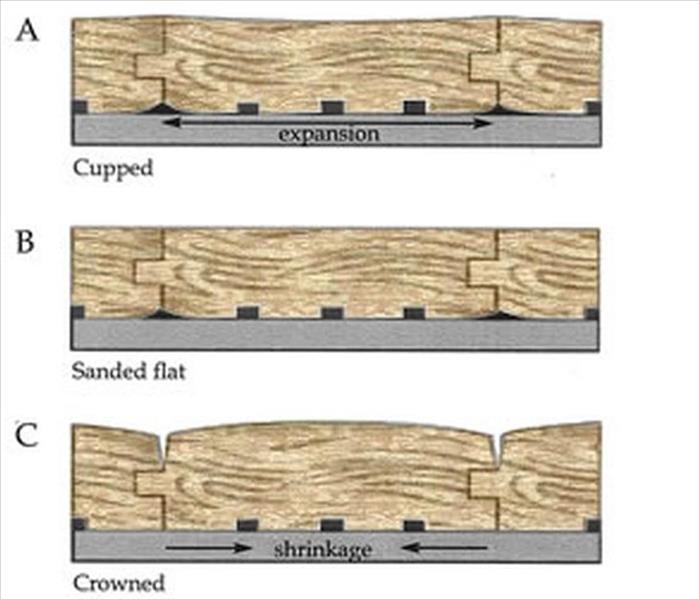 Examples of Floor Damage
Examples of Floor Damage
There are many ways water damage in your home or business can occur. Some of the most common examples are broken or leaking pipes, appliances malfunctioning, or flooding. The key to keeping the extent of water damage to a minimum is a quick response to start drying. Otherwise secondary damage to the property will be inevitable. Secondary damage can be many things from, delaminated carpeting, discoloring of building materials, musty odors, mold, or warped flooring. In this case we are talking about hardwood flooring in particular and what happens. Wood is semi porous material that absorbs water slowly between the wood joints. If wood has been affected by water damage, and is caught in a short amount of time, there are drying mats that can extract the water out of the wood and bring it back to its original state. If a wood floor has absorbed a significant amount of water and has dwelled for an extended period of time, then the wood floor will begin to cup and stain. If the floors are left in this condition it will get worse to the point of no return and must be removed. If wood floors are treated as soon as you see cupping, there is still a chance of them being saved. Water will get extracted, and then once dry, the wood can be sanded and refinished to get a smooth surface again.
If you or someone you know ever experiences water damage, the first thing you should do is call SERVPRO of Southern McHenry County and start the drying process to prevent unnecessary damage from occurring! If water damage occurs and has gone unnoticed, call us in and we will survey the damage. Our goal is to save as much as we can and assist in the replacement of materials if absolutely necessary.
What Technicians Learn During Water Damage Restoration Courses
7/24/2017 (Permalink)
Water damage restoration courses certify technicians in the proper techniques for drying excessive moisture in the environment and structure. Accidents such as sewage backup, flooding, and broken pipes can happen to anyone, and the good news is that most homeowner’s insurance companies will cover the cost. Quick action is necessary to stop further degradation of the property.
What are some of the classes the technician will be introduced to? What is the technician going to be qualified to do upon completion?
The first step is to stop the flow of the liquid. The repair process is not possible without stopping that flow, and a technician is taught to investigate whether or not the problem has been stabilized. The technician is not qualified to repair the cause, but is trained to ensure the situation is stable before proceeding in the restoration.
Extraction is the first step of the drying process, and there are numerous pieces of equipment to remove the excess moisture. There are a number of tools available that help measure the moisture, and the professional knows how to tell the difference between good and bad humidity.
Psychrometrics is the science behind measuring gases or liquid in the environment. The person will learn how to take readings and how to properly decipher those readings. Without psychrometrics the expert cannot know whether or not the process has been successful, so it is a necessary part of standard water damage restoration courses.
Air movers are an important part of the process as they help cycle the air. The technician learns how to choose the right air movers, and how to place them properly for maximum results. It is important to know how to recognize and use Cubic Feet per Minute, or CFM, for this process.
Evaporation happens naturally with proper circulation, but the process has to be motivated to guarantee less damage to furnishings and structure. It can be used to speed the process along, or it can hinder the process. The technician learns how to use evaporation properly to hasten the drying process.
Water damage restoration courses prepare a technician to repair the effects of damaging liquid. Proper techniques will prevent bacteria and mold growth, and the property will be stabilized in turn. Each step is important for a satisfactory outcome.
The most important thing is the technician learns to follow the S500 the procedural standard for the water damage restoration industry, developed by the American National Standards Institute (ANSI) and Institute of Inspection, Cleaning and Restoration Certification (IICRC). Based on years of in-field experience, exhaustive research, and responsible restoration practices, the S500 sets the standard for water damage restoration businesses everywhere.
If you have any questions or you need emergency call us at 847-516-1600.
Southern McHenry County Residents: We Specialize in Flooded Basement Cleanup and Restoration!
7/12/2017 (Permalink)
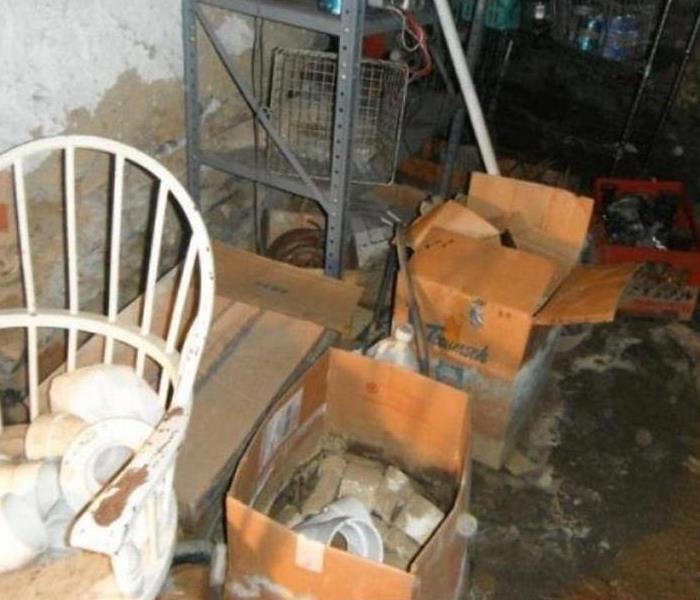 This Southern McHenry County home’s basement flooded due to heavy rains.
This Southern McHenry County home’s basement flooded due to heavy rains.
A basement can flood at any time, although flooding most often occurs during heavy rainfall. Basements are inherently prone to flooding because they are the lowest level of a building and are normally built partly or entirely below ground level. There are a number of reasons why your [[City or County Name]] basement could flood, including:
•A blocked or failed sewer lateral pipe
•Heavy rain causes surface water to pool around your home
•Storm sewer backup
•Sanitary sewer backup
•Foundation drainage failure
•Water supply-line break or hot-water tank failure
•And many more
Have Questions about Basement Flooding?
Call Today - 847-516-1600
If flood water is not handled quickly and properly, it can jeopardize your health and safety, and cause severe damage to your home’s structure. Remember, the longer you wait, the worse the problem will get.
The bottom line: a flooded basement can jeopardize your health, safety, and your home’s integrity. It’s worth making a call to SERVPRO of Southern McHenry County and let our trained, professional crews handle the situation safely and correctly. We have earned the trust of hundreds of homeowners, business owners, and property professionals.
We are Flooded Basement Specialists:
•We are Available 24 hours/7 days per week
•We’re a Preferred Vendor to many National Insurance Companies
•We Bill The Insurance Directly – One Less Thing For You To Worry About
•Our Technicians are Highly-Trained in Water Restoration Techniques
•We use s500 IICRC Restoration Standards
•Advanced Inspection and Extraction Equipment
Basement Flooded? Call Us Today – We’re Ready To Help 847-516-1600
Faster to your Southern McHenry County Water Damage Event
7/21/2016 (Permalink)
Flooding and water emergencies don’t wait for regular business hours and neither do we. SERVPRO of Santa Barbara provides emergency cleaning and restoration services 24 hours a day, 7 days a week—including all holidays.
Faster To Any Size Disaster
Flooding and water damage is very invasive. Water quickly spreads throughout your home and gets absorbed into floors, walls, furniture, and more. SERVPRO of Southern McHenry County arrives quickly and starts the water extraction process almost immediately. This immediate response helps to minimize the damage and the cleaning and restoration costs.
Need Emergency Service? Call Us 24/7 – (847) 516-1600
Water Damage Timeline
Within Minutes
Water quickly spreads throughout your property, saturating everything in its path.Water is absorbed into walls, floors, upholstery, and belongings.Furniture finishes may bleed, causing permanent staining on carpets.Photographs, books, and other paper goods start to swell and warp.Hours 1 - 24:
Drywall begins to swell and break down.Metal surfaces begin to tarnish.Furniture begins to swell and crack.Dyes and inks from cloth and paper goods spread and stain.A musty odor appears.48 Hours to 1 Week:
Mold and mildew may grow and spread.Doors, windows, and studs swell and warp.Metal begins to rust and corrode.Furniture warps and shows signs of mold.Paint begins to blister.Wood flooring swells and warps.Serious biohazard contamination is possible.More Than 1 Week:
Restoration time and cost increase dramatically; replacing contaminated materials and structural rebuilding may be extensive.Structural safety, mold growth, and biohazard contaminants pose serious risks to occupants.About SERVPRO of Southern McHenry County
SERVPRO of Southern McHenry County specializes in the cleanup and restoration of residential and commercial property after a fire, smoke or water damage event. Our staff is highly trained in property damage restoration. From initial and ongoing training at SERVPRO’s corporate training facility to regular IICRC-industry certification, rest assured our staff is equipped with the knowledge to restore your property.
24 Hour Emergency Water Damage Service
7/21/2016 (Permalink)
SERVPRO of Southern McHenry County is available 24 hours a day for water emergencies, large or small. When you are dealing with water damage, immediate action is crucial. A delay of just a few hours can greatly increase the severity of the water damage.
We Answer the Phone Ready to Help
Call Today – (847) 516-1600
We understand that when you call us, you may be feeling confused, stressed, and vulnerable. You need an expert to guide you through this crisis. SERVPRO of Southern McHenry County has the specific water damage training and experience to help you through this tough time. We specialize in water damage restoration—in fact, it's the cornerstone of our business.
What to Expect
When you call, we will ask several questions regarding your water damage emergency. These questions will help us determine what equipment and resources to bring, including how many trained SERVPRO Professionals may be needed.
Our SERVPRO Representative will ask several questions:
Your name and contact informationYour insurance information (if applicable)The street address of the water-damaged home or businessWhen did the flooding or water damage occur?What caused the water damage (if known)?Is there electricity available (on-site)?About SERVPRO of Southern McHenry County
SERVPRO of Southern McHenry County specializes in the cleanup and restoration of residential and commercial property after a fire, smoke or water damage event. Our staff is highly trained in property damage restoration. From initial and ongoing training at SERVPRO’s corporate training facility to regular IICRC-industry certification, rest assured our staff is equipped with the knowledge to restore your property.
 SERVPRO always uses advanced equipment and technology for water damage cleanup and restoration in Newburgh properties.
SERVPRO always uses advanced equipment and technology for water damage cleanup and restoration in Newburgh properties.






 24/7 Emergency Service
24/7 Emergency Service






























